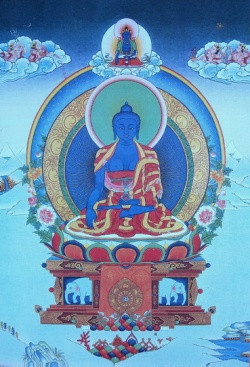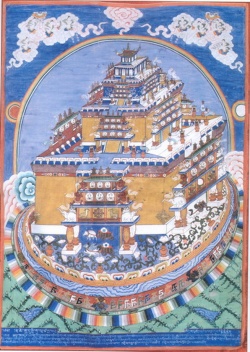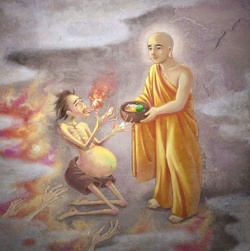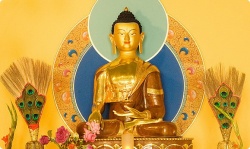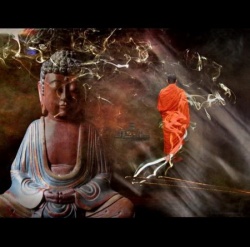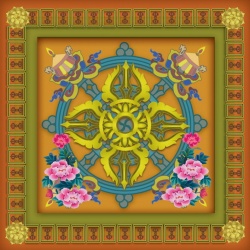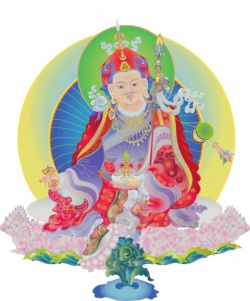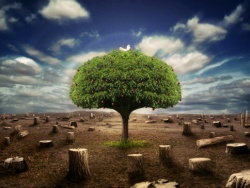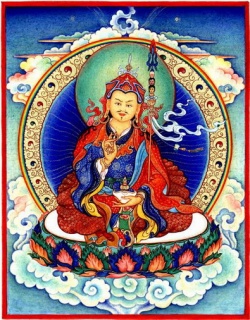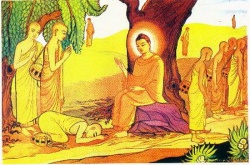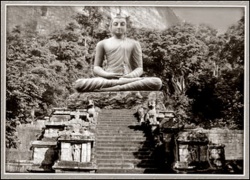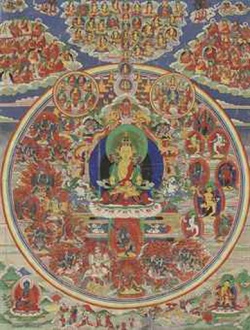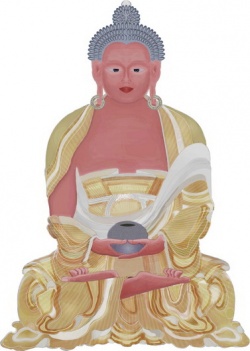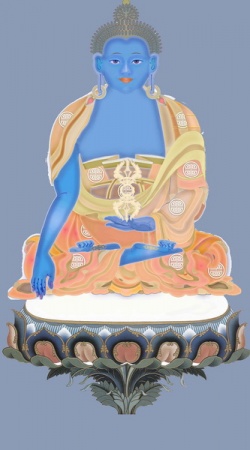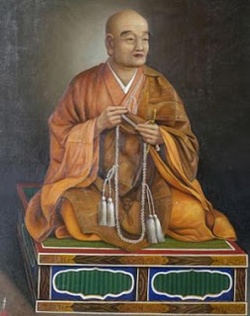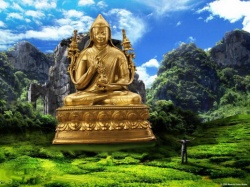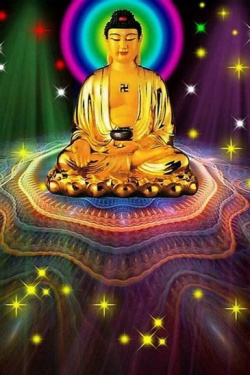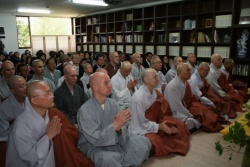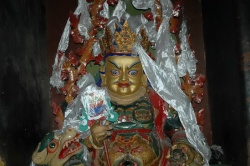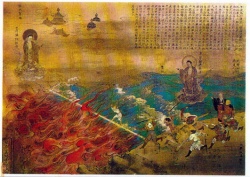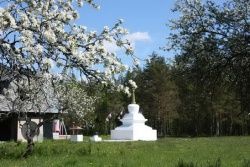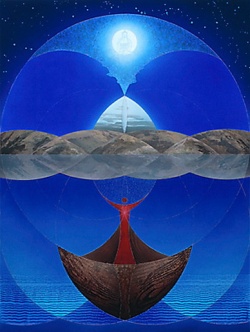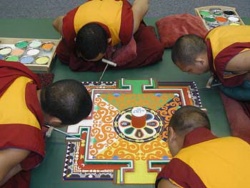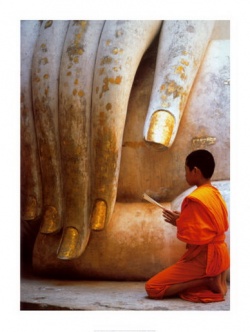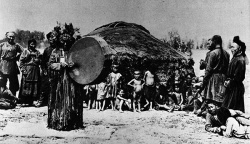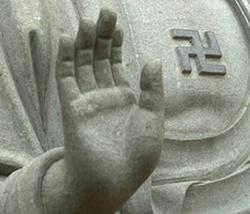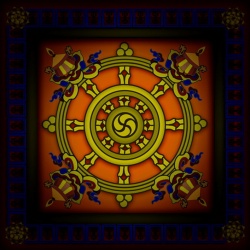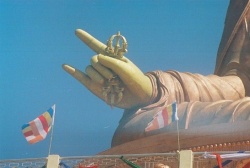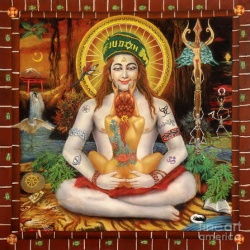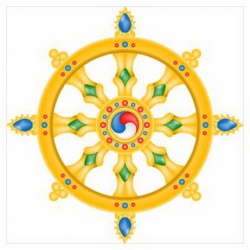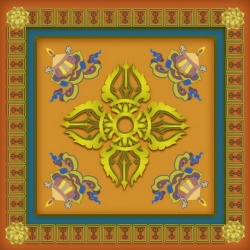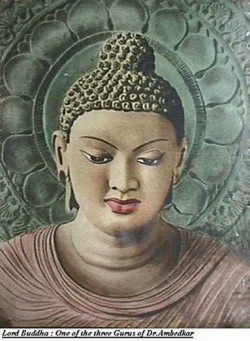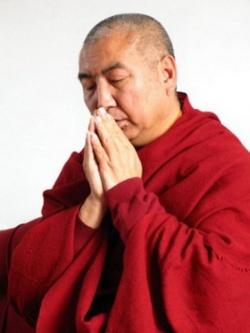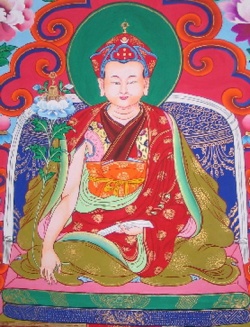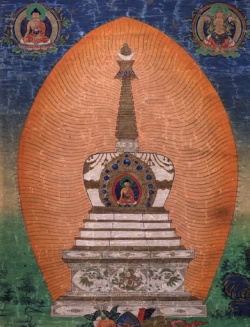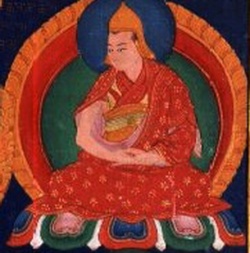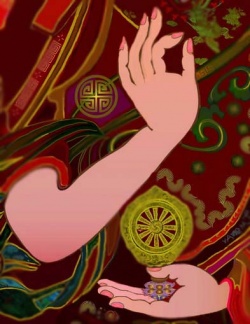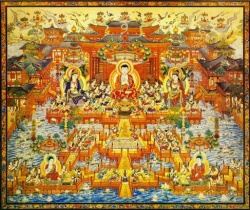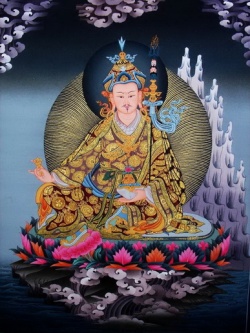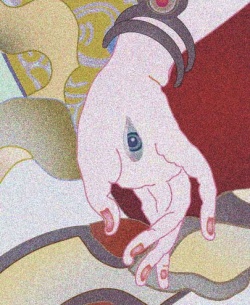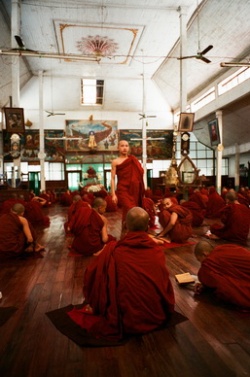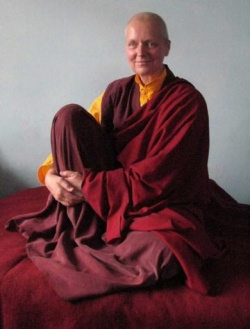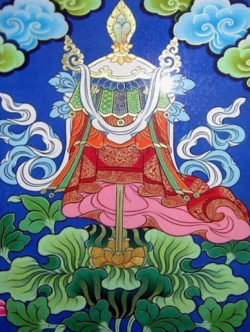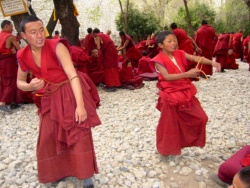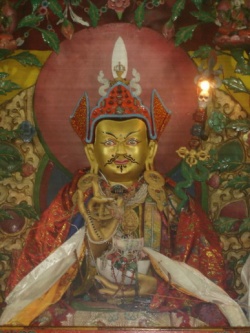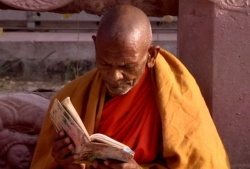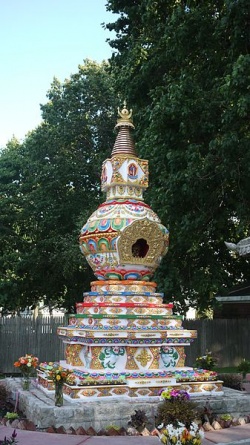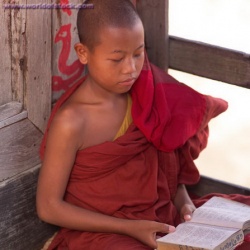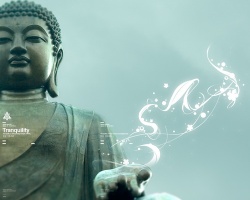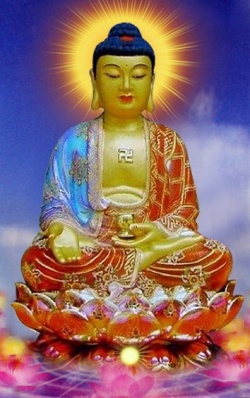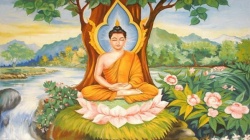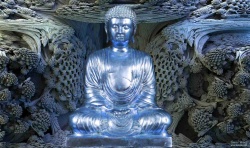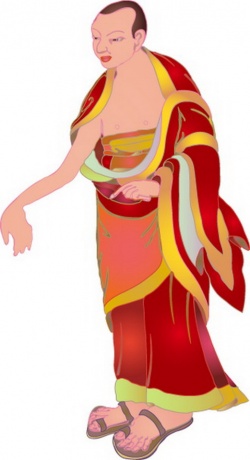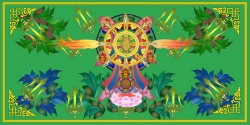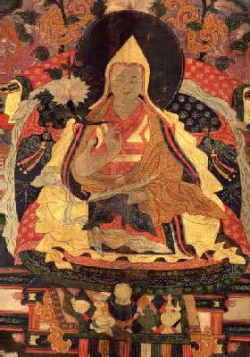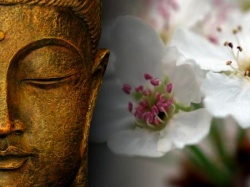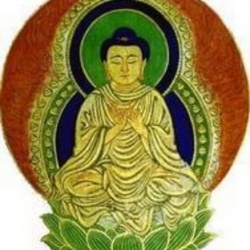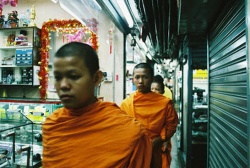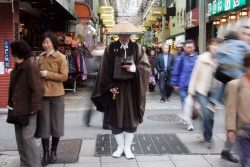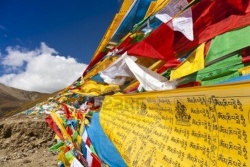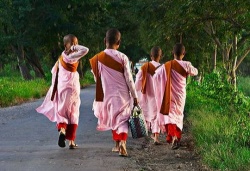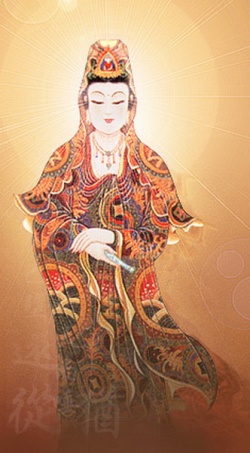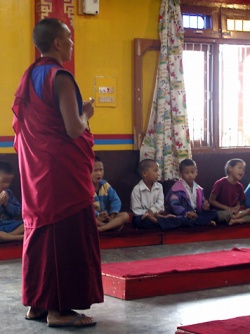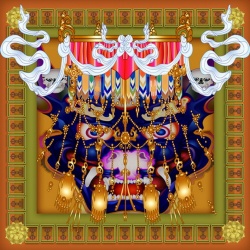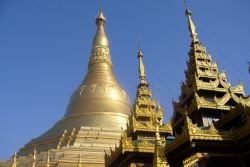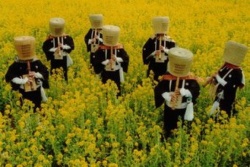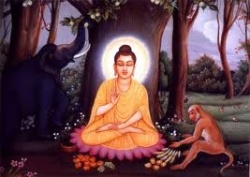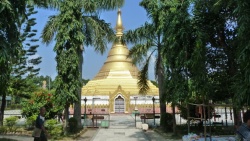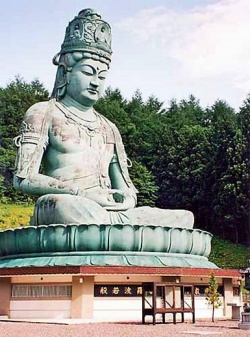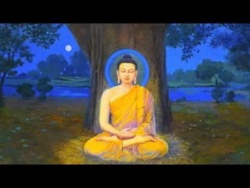The Flower Adornment Sutra: A Commentary by the Venerable Master Hsuan Hua: Chapter Seven
The Flower Adornment Sutra:
A Commentary by the Venerable Master Hsuan Hua
Chapter Seven: The Names of the Thus Come Ones
Translated in the Tang Dynasty by the Tripitaka Master Srãmana Siksananda of Khotan
The Names of the Thus Come Ones, Chapter Seven.
- Commentary
The Names of the Thus Come Ones. “Thus Come One” is one of the ten titles of the Buddha. Every Buddha has ten thousand titles, but people’s memories are too poor to remember so many names clearly in a single lifetime. Somewhere in time, the Buddhas of the ten directions and the three periods of time held a meeting, and decided they would simplify the ten thousand titles of a Buddha to one thousand. However, eventually a thousand were still too many, so the Buddhas investigated the question again and further simplified the matter so that each Buddha had one hundred titles. With the passage of time, that again was still too many, and so finally they were reduced to ten titles, which all Buddhas share. Those ten titles are:
- Thus Come One
- One Worthy of Offerings
- One of Proper and Universal Knowledge
- One of Perfect Clarity and Conduct
- Well Gone One
- Unsurpassed Knight Who Understands the World
- A Hero who Subdues and Tames
- Teacher of Gods and People
- Buddha
- World Honored One
The first title is “Thus Come One”.
He has followed the Way which is Thus, And come to accomplish Proper Enlightenment. That is one explanation. In the Vajra Sutra it says:
The Thus Come One does not come from anywhere,
Nor does he go anywhere,
Therefore he is called the Thus Come One.
Furthermore, “Thus” represents noumenon, the basic substance of principle, while “Come” represents phenomenon, the names and characteristics of specifics. Principle and specifics are non-dual. The Flower Adornment Sutra takes as its creed the harmony of principle and specifics. The title “Thus Come One” exemplifies the non-obstruction of noumenon and phenomena.
The second title is “One Worthy of Offerings”. The Buddha is one who should receive offerings from people and gods of the three realms, and who deserves the respect and reverence of those in and beyond the world. The third title is “One of Proper and Universal Knowledge”. There is nothing which he does not know and nothing which he fails to understand. His knowledge is both proper and pervasive. The fourth title is “One of Perfect Clarity and Conduct”, for the light of his four types of wisdom is perfect and full.
- The wisdom that accomplishes what must be done.
- Wonderful contemplating and investigating wisdom.
- The impartial wisdom of the nature.
- The great perfect mirror wisdom.
The fifth title is “Well Gone One”, one who has gone to a good place, the very best place.
The sixth title is “Unsurpassed Knight Who Understands the World”. Bodhisattvas are called “Surpassed Knights”, for there are still the Buddhas above them. A Buddha, however, is unsurpassed. Since he understands all doctrines, both mundane and transcendental, he is one who well understands the world.
The seventh title is “A Hero who Subdues and Tames”, one who subdues and tames all the living beings in the world.
The eighth title is “Teacher of Gods and People”. The Buddha is the master of the gods in the heavens and the people in the world.
The ninth title is “Buddha”, which will be explained in detail below.
The tenth title is “World Honored One”. “World Honored One” means one who is honored by those in the world and those beyond the world. Those beyond the world have transcended the three realms, which are:
- The Desire Realm
- The Form Realm
- The Formless Realm
Our world is part of the six heavens of the Desire Realm. There are also the heavens of the Form Realm and those of the Formless Realm, making up the Three Realms. The World Honored One is honored by those who have transcended the Three Realms and by those who are within those Three Realms.
All Buddhas hold these ten titles in common. “Buddha” is a Sanskrit word that also takes the form “Buddhaya”. The Chinese generally use only the first syllable fwo of the transliteration fwo two ye. The Sanskrit Buddhaya sounds like the Chinese words puta ye, which in Chinese means “not big”. So you could say that “Buddha” means “not big”, but you could also say a Buddha is not small either. I wrote a verse about Buddhas that says:
Neither great nor small,
Neither gone nor come,
In world systems like motes of dust,
They shine upon each other’s lotus thrones.
-The Ten Dharma Realms are not Beyond a Single Thought.
You may say the Buddha is great, but he’s not. He can:
On the tip of a single hair,
Manifest kshetras of the Jeweled Kings.
And,
Seated in a fine mote of dust,
Turn the Great Dharma Wheel.
On the fine point of a single strand of hair—such a minute area—he can make appear a huge world. That is an example of within the small manifesting the great. His sitting inside of a tiny particle of dust and turning the Great Dharma Wheel is another case of the great appearing within the small.
He can also manifest the small within the great. He can shrink a large world system, or even all the world systems of the ten directions, so that they enter into a tiny mote of dust.
Within the great there manifests the small.
Within the small there manifests the great.
Great and small are unobstructed.
That’s why it says the Buddha is neither great nor small. Do you say he’s small? He isn’t. You may say he is great, but he isn’t great either. “Neither gone nor come”—Do you say that the Buddha has gone somewhere? He hasn’t gone anywhere. Would you say he has come? He hasn’t come either. Why does he neither go nor come? It’s because to the exhaustion of empty space and the Dharma Realm, there is no place where he is, and no place where he is not.
“World systems like motes of dust” refers to the limitless and boundlessly many fine motes of dust throughout all of empty space and the Dharma Realm. “They shine upon each other’s lotus thrones.” Your Buddha light illumines my world system, and my Buddha light shines upon your world system, mutually releasing light and mutually illumining the Dharma Realm. Buddhas could be said to be many, and they could also be said to be one. One and many are non-dual, great and small are unobstructed. Everything is unobstructed and interpenetrating with every other thing—that is the way the Dharma Realm of Buddhas functions.
“Buddha” has three meanings:
- One who is self-enlightened.
- One who enlightens others.
- One who is perfect in enlightenment and conduct
That he is self-enlightened means that, no matter what he does, he:
Returns the light and reverses the illumination.
Turns back and seeks everything in himself.
He has that kind of spirit. To sum it up, he is incapable of being muddled, for he truly understands. Since he has true understanding, in everything he does, he wishes to benefit other living beings. So he benefits himself and benefits others. In everything he does, there are advantages for him and others too.
Limitless kalpas ago, Shakyamuni Buddha was a deer, the leader of a herd of five hundred. And guess who else was there? Devadatta, who was also a deer king with a following of five hundred deer. In a later life when the Buddha realized Buddhahood, Devadatta became the Buddha’s jealous cousin and tried to kill him. But in that earlier life when both were deer kings, there was a king among the people who used a lot of manpower and machinery to corral vast numbers of wild animals into a certain area. He planned to hunt them all down and kill them on the grounds. Then Shakyamuni Buddha, in the form he had taken as a deer king, had a meeting with the deer king Devadatta. They said to each other, “We should save the lives of our retinue. We shouldn’t let the king kill all of us. How can we save ourselves? Let’s go talk it over with the king and petition him not to kill us off.” Although they were deer, they could speak the language of people. The two deer went to see the king, and when they encountered the armed guard at the gates they said in a commanding tone, “We would like an appointment with the king. Can you deliver our message?” When the guard heard that the deer could speak the human language, he went to repeat their message to the king.
The king also found it strange to hear that the deer could talk, and he agreed to an audience with them so they could state their petition. The two deer kings went before the king and said, “We are deer. Every day you kill seven or eight of us—more than you can possibly eat in a single day. What cannot be eaten is left to spoil. Wouldn’t it be better if we did it this way: every day we will take turns supplying you with one deer, and in that way you can have fresh venison every day without killing us off at once. If you use this method, your supply of venison will never run out. Several hundred years from now there will still be venison to eat.”
Because he saw the sense in their petition, and because the deer could speak, the king was moved to grant their request. Each of the deer kings, on alternate days, sent the king a deer. Now, one day, it happened to be the turn of a pregnant doe in Devadatta’s herd to go sacrifice herself to the king. Her fawn would probably be born in a day or two, so she pleaded with the deer king Devadatta, “Could you send someone else in my place today? Then after the fawn is born, I will go to the king and sacrifice myself.”
Devadatta replied, “Certainly not. It is your turn and you must go. There is no politeness in this matter. You don’t want to die. Who does? Not one of the deer wants to go to their death. You want to stay alive a few more days now that it has come around to your turn, but that is impossible. It’s out of the question.”
The pregnant doe’s eyes brimmed with tears and she went to talk to the deer king who would in future lives become Shakyamuni Buddha. Although she didn’t belong to his herd, she went to plead with him and ask if he could work out a temporary exchange so that she could live a few more days until her fawn was born. As he considered her request, Shakyamuni Buddha realized that not one of his five hundred deer would want to go in her place. However, the Buddha said to her, “Fine. You stay in my herd, you don’t need to go.” Then the deer king Shakyamuni Buddha went himself to be sacrificed in her place.
The king asked him, “What are you doing here? Have all of your deer been eaten? Is your herd all gone? Why have you come?”
And since he could talk, the deer king Shakyamuni Buddha said, “King, you haven’t eaten all of our deer; on the contrary, we are prospering. Day by day our herds are increasing. You only eat one deer a day, and in one day our does give birth to many fawns.”
The king said, “Then why have you come yourself?”
Shakyamuni Buddha explained, “There is a pregnant doe whose fawn will be born in a day or so. It was her turn to come today, but since she wanted to wait until she had given birth to her fawn before she came to let the king eat her, she came to me and pleaded to have someone sent in her place. I thought over her request and realized that none of the deer in the herd would want to die before they had to, so I came myself to substitute for her.”
When the king heard that, he was profoundly moved, and he said, “From now on, don’t send any more deer to the palace.” Then he spoke a verse:
You are a deer with a human head.
I am a person with a deer’s head.
From this day forward, I will not
Eat the flesh of living beings.
He said, “Although you have the head of a deer, you are a human being, and although I have the head of a human being, I am a deer.” Then he vowed never to eat the flesh of living beings again. Because of that, the deer population in the park increased significantly; and the park came to be known as the Deer Wilds Park.
In past lives, the Buddha went through everything. He was a deer king, yet even as a deer he was able to influence a king to change from the bad to the good and turn over a new leaf.
In past lives the Buddha was a carpenter and a stonemason. When he worked as a carpenter and did jobs for other people, he put all of his efforts into it. Beyond what was expected of him, he put extra effort into helping other people. Most people, while doing a job for someone else, don’t want to put their full effort into it. But whatever the Buddha did, half of it was to benefit himself and the other half was to benefit others. He absolutely did help the world and benefit living beings, and in all he did he was a model for others. Whether in building temples or constructing bridges, or establishing Way Places, he was always extremely enthusiastic. He wasn’t just working for a salary. He put his whole heart into it and used all of his efforts to establish Way Places. When he was a stonemason, he also benefited other people. Whatever job he did, he employed half the time helping others. Because of his helping other people life after life his own enlightenment became perfected. But he didn’t just want to be that way himself; he also wanted to lead other people to be that enthusiastic in their work, too. That way, his enlightenment of others also became perfected. When one has perfected one’s own enlightenment and that of others, one is said to be perfect in enlightened conduct. As it is said;
He is perfect in the three enlightenments,
And is replete with the myriad virtues.
Therefore he is called a Buddha.
That is what “Buddha” means.
The Buddha benefits other living beings and we who study the Buddha should do so too. We should not just be concerned about ourselves all the time. We should look at the large picture. For example, in this era, people are confused and upside-down. We should find some way to guide all people so that they are no longer confused and upside-down. That is the kind of work involved in enlightening self while enlightening others.
Question: Why was there no mention of Vairochana Buddha in the Vairochana Chapter Six of the Flower Adornment Sutra?
Answer: The Prince Great Awesome Light was Vairochana Buddha. Wait and it will gradually become clear. There is a connection between what comes before and what comes later. For example, I have several names, too: a layname, a left-home title, and a Dharma name. I’m also called the Living Dead Person, the Monk in the Grave, and “Candy”.
At that time, the World Honored One was in the country of Magadha, in the Aranya Dharma Bodhimanda, and had just accomplished Proper Enlightenment. Within the Universal Light Palace, he was seated upon the lion’s throne of a treasury of lotus flowers.
- Commentary
We previously discussed the title, “The Names of the Thus Come Ones”, and summarized the ten titles of the Buddha. This is Chapter Seven of the Sutra and it is the Second Assembly. The Flower Adornment Sutra was spoken in Seven Places and Nine Assemblies.
At that time means right after the previous Vairochana Chapter had been spoken, and right before the Names of the Thus Come Ones Chapter was spoken. This chapter belongs to the section “How Cultivation of the Cause Tallies with the Result and Gives Rise to Understanding”. When you cultivate on the causal ground it is certain that you will obtain the perfection of the resultant fruit position. While on the causal ground, you tally with the principle—the substance of the result, which is enlightenment. That is why it is known as the section, “How Cultivation of the Cause Tallies with the Result and Gives Rise to Understanding”. Up to the present chapter, the Sutra has been discussing the Bringing Forth of Faith, urging people to produce faith and to understand cause and result. Now it goes on to discuss cultivation of the cause. That is:
Whatever kind of cause you plant,
you will reap that kind of result.
If you plant a good cause, you will reap a good result.
If you plant a bad cause, you will reap a bad result.
If you plant the causes for Bodhi, you will reap the fruit of Buddhahood.
In this section “How Cultivation of the Cause Tallies with the Result and Gives Rise to Understanding”, we reach the Second Assembly, which is the assembly held in the Universal Light Palace. The First Assembly took place in the Bodhimanda. The Buddha spoke the Flower Adornment Sutra in the Universal Light Palace. Some say that the Universal Light Palace is made of all kinds of gems, and that since it is made of all precious jewels, it universally emits light.
At that time, The World Honored One was in the country of Magadha —“Magadha was the name of a country in India. He was in the Aranya DharmaBodhimanda. An “Aranya” is a still and quiet place, a place that is very peaceful and quiet and good for cultivating the Way. “Bodhimanda” means a Bodhi Way Place. The Thus Come One was beneath the Bodhi Tree, upon the Vajra Jeweled Seat. And had just accomplished Proper Enlightenment. At that time, he had just become a Buddha after sitting beneath the Bodhi Tree for seven weeks-forty-nine days. Before that, he had cultivated for six years on Ice Mountain, each day eating only one sesame seed and one grain of rice. He had been cultivating that kind of bitter practice, which was really bitter to the extreme. Of the five people who had come with him, some were unable to take the bitterness and left. He starved on Ice Mountain to the point that he was as thin as a stick of firewood, having become that emaciated from cultivating ascetic practices.
Afterwards, a goddess made an offering of milk to the Buddha. After the Buddha had accepted the offering of milk gruel from the goddess and eaten it, the two Shakyans who had stayed with the Buddha to cultivate bitter practices became upset. They said, “Before, the Buddha was able to cultivate bitter practices, but now he can’t. He’s eating milk porridge. That’s not how a cultivator of the Way should act! He won’t be able to have success. Let’s not stay with him.” So they left. Then after all the Five Bhikshus—Ajnatakaundinya and the others—had left, the Buddha was left alone to cultivate and he felt that after six years he should go somewhere else to do his work. So he went and sat beneath the Bodhi Tree. There, he made a vow saying, “I’m going to sit beneath this Bodhi Tree, and if I don’t accomplish my work in the Way, I shall sit here forever and never get up.” He sat there for seven weeks—forty-nine days and then:
At midnight he saw a bright star,
And became enlightened to the Way.
He all of a sudden opened enlightenment and became a Buddha. When the Buddha had just accomplished enlightenment beneath the Bodhi Tree, he sighed three times saying:
Every living being has the virtuous characteristics and wisdom of a Thus Come One.
It is only due to false thinking and attachments,
That they are unable to certify to their attainment.
After opening enlightenment, the Buddha was staying within the Universal Light Palace, which was made of a multitude of jewels and which constantly emitted light. Hewas seated upon the lion’s throne of a treasury of lotus flowers. He was sitting on the lion’s seat which was made of a treasury of infinite numbers of lotus blossoms.
There are Seven Places and Nine Assemblies where the Flower Adornment Sutra was spoken.
The Bodhimanda was the first,
The ninth the Jeta Grove.
The third and fourth, the Trayastrimsha
And Suyama Heavens.
In the Universal Light Palace were
The second, seventh, and eighth.
Tushita and Comfort from Other’s Transformations, the fifth and sixth.
The First Assembly was held in the Bodhimanda, the Bodhi Way Place where the Buddha accomplished Proper Enlightenment beneath the Bodhi Tree. The Ninth Assembly was held in the Jeta Grove. The Third Assembly took place in the Trayastrimsha Heaven—the Heaven of the Thirty-Three. The god Shakra rules the central heaven, overseeing the thirty-two other gods who rule in the respective heavens which are clustered together in four groups of eight in each of the four directions around it. The Fourth Assembly was in the Suyama Heaven, the Heaven of Well-Divided Time, where the opening and closing of a lotus flower signals the passage of time. That heaven is beyond the light of the sun and the moon. Three Assemblies, the second, seventh, and eighth, were held in the Universal Light Palace. The Fifth Assembly took place in the Tushita Heaven, the Heaven of Contentment. The Sixth Assembly was in the Heaven of Comfort from Others’ Transformations. That makes the Seven Places and the Nine Assemblies.
Wonderful Enlightenment was all perfected.
- Commentary
Wonderful Enlightenment is called wonderful because the Buddha’s enlightenment transcends the principles to which most people become enlightened. It is the very highest, with nothing above it—it’s inconceivable. That’s why it is called the Unsurpassed, Right, Equal, Proper Enlightenment. “Wonderful” means Unsurpassed, Right, and Equal. This is enlightenment taken to the ultimate point, and so it was allperfected. That means there was nothing more that could be enlightened to—the enlightenment was ultimate. Therefore the Buddha is called the Unsurpassed Knight, for there is no one wiser than him. That his “wonderful enlightenment was all perfected” means that he had perfected the enlightenment of self, the enlightenment of others, and his practice of enlightenment. This kind of enlightenment is such that,
There is nothing which one does not know, And nothing which one cannot do.
It was previously explained that this is Chapter Seven, The Names of the Thus Come Ones. Starting from the line of text that says, “Wonderful enlightenment was all perfected” this section praises the Buddha’s virtue, his virtue which was in no way deficient but rather complete and perfect. It can be called wonderful enlightenment, or good enlightenment as well as proper enlightenment, because the prefix ‘su’—in Sanskrit, which this is translated from—has those three meanings:
- wonderful,
- well or good,
- proper
It can be translated those three ways, so you can say “wonderful enlightenment”, or “good enlightenment”, or “proper enlightenment”. In general, this term means the Buddha has:
His wisdom, his virtuous characteristics, and his reward of blessings are all perfect and complete. The nine statements that follow all proceed from this first statement “wonderful enlightenment was all perfected”. The phrase “wonderful enlightenment was all perfected” is the general statement, which includes the meanings of the nine phrases that follow. The principles of the nine subsequent statements are all contained within that one phrase, so it is called a general statement. Each of the nine phrases of Sutra text which follow, down through the line “He universally saw throughout the three periods of time”, are particular statements. There is the general and then there are the particulars. The general is a general version of the particulars, and the particulars are the particular instances of the general.
The two activities were forever ended.
- Commentary
The two activities were forever ended. If you can’t tell me what the “two activities” are then I won’t be able to tell you either. Absolutely all of you should be able to answer; otherwise what Buddhadharma are you studying?
The two activities are the activity of afflictions and the activity of what is known. The very best is not to want afflictions at all. You shouldn’t want even the most seemingly insignificant afflictions, for if you can’t give up those seemingly insignificant afflictions, you still won’t be able to get out of the Three Realms. How much less should you want the very worst afflictions! The obstacle of afflictions can obstruct your resolve for Bodhi. Afflictions have to do with common people. The only thing that appears before ordinary people is afflictions. No matter what comes up, they get angry and have afflictions. What is the essential cause of afflictions? They come from being selfish and self-seeking. If something is not to your own advantage you get angry. Or, if something doesn’t go the way you want it to, you get mad. Or if something is harmful to your own reputation or position you will get afflicted. All of you think it over: the basis of afflictions is selfishness and seeking for self-benefit. If you are unselfish and not out for self-benefit, you won’t have any afflictions. If in every way you are not afraid of being obstructed by other people, if you feel, “No matter how they treat me, it doesn’t matter”, then how could you have afflictions? Wouldn’t you agree?
Besides the obstacle of afflictions, there is the obstacle of what is known. Those of the Two Vehicles possess the obstacle of what is known. They are obstructed by what they know. They say, “I know the Buddhadharma. I know how to cultivate the Four Noble Truths and the Twelve Links of Conditioned Co-production. I can end birth and death. I know all of the Buddha Dharmas.” Those of the lesser vehicle say, for example, “The Dharma I know was all spoken by the Buddha.” People of the small vehicle have small knowledge and small vision, small minds and small measure. They halt halfway down the road. Halfway there, they set limitations for themselves, saying, “That side isn’t mine, this side is.” People of the lesser vehicle know the events within 80,000 great kalpas, but they don’t know anything beyond 80,000 great kalpas. That is what’s called knowing what is near but not knowing what is far away. When one knows what is close at hand but doesn’t know what is distant, then there are things one knows and things, which one does not know. There is that which is not known—because there is that which is known. One knows the near and doesn’t know the far. One knows the ordinary, and does not know the sagely. One knows what common place people are like, but doesn’t know what sages are all about. As it is said:
Those on the First Ground don’t know the realm of the Second Ground.
Those on the Tenth Ground don’t know the realm of Equal Enlightenment.
Those of Equal Enlightenment also don’t know the realm of Wonderful Enlightenment.
If you are off by just a little bit, you won’t know. It’s like when you go to school. When you are in the first grade of elementary school, you don’t know what people are studying in high school. When you get into high school, you still don’t know what is studied in college. When you finally do know what is studied in college, you still won’t know what people preparing for the Master’s Degree are studying. After the Master’s degree is the Doctorate, the Ph.D. It goes step by step, and if you haven’t reached the level, you won’t know what that kind of state is like. Those of the lesser vehicle know the near and don’t know the far. They know the ordinary, but do not know the sagely. If people of the Two Vehicles choose to, they can observe all of the thinking of ordinary people, and know whatever kind of false thought they are having. But they don’t know the movements in the minds of sages. For instance, they don’t know what Bodhisattvas intend to do. They have no way to drill through the skin on the bellies of Bodhisattvas. They can be supervisors for ordinary people, but that won’t work with sages, with Bodhisattvas.
At this point, I won’t hesitate to illustrate this principle with a story. Actually, a good many of you have heard it before; but there are one or two who have never heard it. Those of you who have heard it can stop up your ears, and enter into the Samadhi of the Person of the Way with no Mind. Or after stopping up your ears, you can indulge in the false thoughts you need to indulge in. I am very democratic and an advocate of freedom—very expedient—so everything’s okay. See how wonderful this is? It’s wonderful enlightenment, but it hasn’t been all perfected.
In the past, when the Buddha was dwelling in the world, there was an old man of over eighty who wanted to leave the home life. Just when he arrived to leave home, the Buddha happened to be away from the Jeta Grove either responding to offerings or to see to some special business. Since the Buddha was away and could not be consulted, all of the Great Arhats used their spiritual penetrations to contemplate the causes and conditions of this old man of over eighty years of age who had arrived at the Jeta Grove asking to leave home. Those Arhats wanted to try out their talents and see what factors lay behind the old man’s wish to leave home. All of those disciples of the Buddha—the Great Arhats—were students of the Two Vehicles. They were sages who had certified to the fruit. However, when they looked throughout 80,000 great kalpas, they discovered that the old man hadn’t planted even a hair’s breadth of good roots in all that time. He hadn’t planted a single good root. The Great Arhats all frowned among themselves in consternation. Although they didn’t get afflicted, still they didn’t look too happy about the whole thing, and they said, “We can’t let this person with no good roots leave home.” Having reached this mutual agreement, they said, “Fine, we’ll tell him to go away.” They were brief and to the point with the old man and without going into detail about the last 80,000 great kalpas, just said, “You don’t have any good roots, you can’t leave home.” As it is said;
Don’t think that leaving home is an easy thing to do.
It can happen only from having planted seeds of Bodhi in distant times past.
So the Arhats told the old man, “You haven’t planted the causes for Bodhi, so even if you want to leave the home life, you can’t. It won’t work. You’ll have to go away.”
When the old man heard that, he said, “You see how old I am? My wish to leave home comes with the true intention to cultivate. It’s not because I don’t have any food to eat or clothes to wear that I have come here hoping for good meals and an easy life. I don’t intend to become someone good at eating and lazy at working. That’s not the case at all. I have realized that there is no great meaning to human life, and for that reason I am determined to leave home. So you certainly should accept me.”
The Great Arhats said, “If we say you’re not accepted, you’re not accepted. There’s nothing more to say. Get out of here fast! Otherwise, we’ll beat you!”
The old man said, “Well, if you won’t let me stay and leave home, then I’ll go.” He went off crying. As he walked he said to himself, “The Buddha’s disciples aren’t the least bit compassionate. I wanted to leave home and they said I didn’t have any good roots. Then when will I ever have good roots and be able to leave home?” He cried and cried and felt that there was no meaning to being alive, so he decided to go jump in the Ganges River and end his life. As soon as he got there, he wrapped up his clothes and was about to jump into the Ganges River, when all of a sudden the Buddha came up and grabbed hold of him.
“The Buddha said, “Old man, what do you think you are doing? Don’t be so stupid!”
The old man saw that the person who had taken hold of him was a monk, but he didn’t recognize him as the Buddha, for he had never seen the Buddha before. He said, “I wanted to leave home and I went to the Jeta Grove, but none of the left-home people would let me stay and leave home. Now I feel that there is no meaning or worth to human life, and since I wanted to leave home and wasn’t accepted, I’d rather die and get it over with, and put an end to my life.”
The Buddha said, “Don’t kill yourself. Don’t jump into the Ganges River. I’ll let you leave home.”
“Who are you?” asked the old man.
The Buddha said, “I am Shakyamuni Buddha.” Then he took the old man back to the Jeta Grove with him.
When they got back, the Great Arhats still had misgivings about what the Buddha was doing and wondered, “This person doesn’t have any good roots and the Buddha is letting him leave home. That’s not in accord with Dharma. It’s illegal. It’s a mistake in cause and effect.” Yet they didn’t dare to ask about it. So the Buddha let the old man leave home and he stayed right there and started cultivating. Right away he certified to the fruit of Arhatship. Then all the Arhats began to have doubts like, “This just can’t work. It’s impossible. He doesn’t have the least bit of good roots, so how can he certify to the Fruit? It’s too weird and doesn’t fit at all with the principle of cause and effect that the Buddha has taught us.” They kept voicing their objections. Eventually some of them couldn’t stand it anymore and they went and asked the Buddha about it. They said, “Buddha, we really don’t understand this person’s causes and conditions, and so we request the Buddha to explain them for us. Throughout 80,000 great kalpas he hasn’t planted the least bit of good roots, so how can he have certified to the fruit right after starting to cultivate?”
The Buddha said, “Don’t you realize you are only able to see events inside of 80,000 great kalpas? You know about the near but don’t know about the far. You have no idea of the causes and conditions that go beyond 80,000 great kalpas. This elderly person, over 80,000 great kalpas ago, was a wood gatherer in the mountains. One day as he was gathering firewood, he saw a tiger approaching, so he climbed a tree. The tiger started gnawing on the tree to cut it down and eat the man. Just before the tiger could manage to gnaw it through, the man who was watching from up in the tree, in his terror called out once, ‘Namo Buddha!’ In ordinary times he didn’t light a single stick of incense, but when he got nervous, he clutched the Buddha’s feet. As soon as the tiger heard him cry ‘Namo Buddha’, it ran away. Afterwards, since, as the saying goes, ‘Once the sore is healed, one forgets the pain’, he didn’t recite the Buddha’s name anymore. You could say, ‘Once the danger was over, he forgot the Buddha’. But today he was due to reap the fruit of that one cry ‘Namo Buddha!’ so he came to leave home, and upon starting to cultivate, he certified to the fruit. All of you Arhats just know about the common and don’t know about the sagely. You know the near and do not know the far, so you still have what you know and what you don’t know.”
But there is nothing, which the Buddha does not know. The Buddha has no afflictions. He doesn’t have the obstacle of afflictions or the obstacle of what is known. The two activities, meaning these two obstacles, are said to be forever ended.
Are there any questions? If I spoke incorrectly you can bring it up for discussion. It’s not for sure that everything I say is right. There is still “He had reached the marklessness of Dharmas”, which I haven’t finished lecturing. Do you all understand the explanation of “the two activities were forever ended”, now?
I know today that there were people having this false thought, “It’s being lectured so slowly. He only explained four characters.” Who told you to always think before that I was lecturing too fast? You thought I was lecturing too quickly, so now I am lecturing more slowly.
He had reached the marklessness of dharmas.
- Commentary
He had reached means that he had penetrated through to and understood…what? The marklessness of dharmas. What is the marklessness of dharmas? It is the pure, inherent, wonderful nature of True Suchness. Basically there is inherent purity. One doesn’t need to add or subtract anything. There is neither increasing nor decreasing of the pure, inherent, wonderful nature of True Suchness. That is the marklessness of all dharmas. The marklessness of all dharmas means that one doesn’t attach to any marks. How can you manage not to attach to any marks, and to have the two activities forever ended? You have to perfect wonderful enlightenment. When your wonderful enlightenment is all perfected then the two activities can be forever ended, and you can reach the marklessness of dharmas.
He dwelt in the Buddhas’ dwelling. He had attained sameness with the Buddhas.
- Commentary
He dwelt in the Buddhas’ dwelling. He had attained sameness withthe Buddhas. What is meant by dwelling in the Buddhas’ dwelling? The Buddhas dwell in the Four Unlimited Minds of Great Kindness, Great Compassion, Great Joy, and Great Giving. In order to rescue living beings, at all times, the Buddhas dwell in great compassion and benefit all living beings. Buddhas also constantly abide in three kinds of dwellings, which are:
The dwelling of sages includes the sages of the Three Vehicles:
- The vehicle of Sound Hearers
- The vehicle of Those Enlightened
- to Conditions
- The vehicle of Bodhisattvas.
The dwelling of the divine includes all the gods who dwell in the heavens. Dwelling in the divine is practicing giving, holding precepts, and having a mind of goodness. The dwelling of purity refers to abiding in the pure Brahma dwelling, that is, dwelling in the Form and Formless realms. The dwelling of purity is dwelling in the Four Unlimited Minds.
There is also another meaning to the Buddhas’ dwelling. The Buddhas always dwell in impartial great compassion and forever concern themselves with benefitting living beings. And, finally, all sages dwell in samadhi—proper concentration. All of this is meant by the phrase, “He dwelt in the Buddhas’ dwelling”.
What is meant by “He had attained sameness with the Buddhas”? It means being able to certify to the pure, inherent, wonderful nature of True Suchness. What is certified to and attained is Unsurpassed, Right, and Equal, Proper Enlightenment. One attains wonderful transformations, which are effortless and inconceivable.
He had arrived at the place of non-obstruction, the unturnable Dharma.
- Commentary
He had arrived at the place of non-obstruction, means he had certified to the state of having no obstructions. How does one certify to the state of having no obstructions? One needs to cultivate the Six Paramitas, the Ten Thousand Conducts, and use precepts, samadhi, and wisdom to counteract greed, hatred, and stupidity. Then one has no obstructions. Once one is free from greed, hatred, and stupidity, then one has no obstructions. Why is it that for limitless kalpas to the present we have not become Buddhas? It is just because we have not been able to eradicate the three poisons of greed, hatred, and stupidity. The Buddhadharma tells us to “diligently cultivate precepts, samadhi, and wisdom.” But we change the word “diligently” into “lazily”. It’s supposed to be that we are diligently cultivating but instead, we lazily cultivate them—which just means we don’t really cultivate them at all. We are lazy. We say, “Today, I’ll take the day off, but tomorrow, I certainly will cultivate. I absolutely will cultivate precepts, samadhi, and wisdom.” But then when tomorrow comes, we are as if half asleep: “I’ve got to sleep a little longer.” We keep waiting for tomorrow, tomorrow, and tomorrow until an entire life of tomorrows has passed, and it turns out we never did diligently cultivate precepts, samadhi, and wisdom. That is a case of lazily cultivating precepts, samadhi, and wisdom. We postpone cultivating so in the end we cannot put to rest greed, hatred, and stupidity. Not putting to rest greed, hatred, and stupidity, becomes a case of the more greed, hatred, and stupidity, the better. Whatever it is, one wants it, until one’s greed becomes insatiable. When one doesn’t get all the objects and enjoyments one is greedy for, then one becomes full of hate and resentment.
Accusing heaven and blaming people.
One says, “God, you really don’t know how to be god. How come you don’t help me out? Other people have so much money and I’m so poor. You’re too unfair.” That’s accusing heaven. Blaming people is feeling that everyone treats you badly, that no one is right. From accusing heaven and blaming people, one becomes stupid. Once one becomes stupid, one creates the offenses of killing, stealing and sexual misconduct. One is greedy for objects, for beautiful forms, and for all kinds of enjoyments, and then one kills, steals, and engages in sexual misconduct. Why does one do those things? It is due to greed, hatred, and stupidity. When one becomes stupid, one cannot obtain liberation. But when you reach the place of non-obstruction, it means that you cultivate the Six Paramitas and the Ten Thousand Conducts. You:
You don’t commit the offenses of killing, stealing, and sexual misconduct, and you are not attached to anything, and then you achieve liberation. Obstructions are gone. Then you truly obtain freedom.
The unturnable Dharma—if interpreted literally, it means this dharma cannot be turned, and if it can’t be turned, that means it can’t be spoken. Someone thinks, “We are turning the Great Dharma Wheel, but this means the Wheel of Dharma can’t be turned, and that means not to lecture the Sutras, right?” Now here we are lecturing Sutras and turning the Dharma Wheel. You’re recording and that is turning the dharma Wheel. Translating is also turning the Dharma Wheel. All of us here now are turning the Great Dharma Wheel within this Way Place. “Unturnable Dharma” means that the Sutras that are spoken and the principles and teachings cannot be broken up by those of outside ways. They can’t smash them. That it is unturnable means that this type of teaching cannot be moved by the theories of externalist paths that worship fire, and heterodox ways that cultivate unbeneficial ascetic practices—there are all kinds of outside ways, each with its own theories. If you don’t have any samadhi power, as soon as they start talking, they’ll turn you. Let’s not talk about anyone else, just take the “Hare Krishnas” who jump up and down and make a lot of noise. They wear gaudy clothes and sing and dance, and make people think, “Wow, that’s a whole lot better than watching a striptease show. See the men and women together, it’s really hot stuff! I’m going to join that group, too. It’s got a lot more going for it than looking into apartment windows.” One is turned by the state. That’s being turned by those of outside ways. But the Dharma of unturnability means that you will become so that those of outside ways cannot move or turn you. Whether it’s striptease or what—women not wearing any clothes, or men not wearing any clothes, or not wearing clothes in the house—don’t be turned by the outside ways.
For example, after having taken refuge with the Triple Jewel, one decides that after awhile one will become a Christian, Catholic, or involve oneself with all kinds of outside ways. The unturnable Dharma means that outside ways have no way to turn you. That’s the unturnable Dharma.
His conduct was without obstruction. He established that which was inconceivable and he was able to universally contemplate the three periods of time.
- Commentary
His conduct was without obstruction. “Conduct refers to one’s actions—how one acts when one does things. Whatever you create, you have to endure. One must endure all kinds of opposing situations. Don’t be turned by opposing circumstances. You want to be able to turn those states, and not be turned by them instead. National Master Ching Liang’s Su Chao (commentary and subcommentary) to this Sutra says;
Regarding all the ways in which people of the world conduct themselves,
Whether opposing, according, demonic, or hateful,
One is able to be unobstructed.
Opposing refers to something that doesn’t accord with one’s intent and thought.
According refers to something that does accord with one’s intent. In opposing conditions you want very much to have things go a certain way, but they don’t. The conditions oppose you. According situations are when you want very much to have things go in a certain way and they do.
Opposition can also be referred to as ‘ni’ oppression. When this occurs, it becomes difficult to fulfill one’s intent. You think everything is good, but then the bad comes along. You aren’t happy when people scold you, then everyday people come and scold you. That’s what opposition means. On the other hand, according means that whatever you want, you are able to obtain. For example, kids are happy when they have candy to eat. They say, “Oh, you have a piece of candy”. That’s an example of according with one’s intent.
Obstructions are sometimes called “demon obstructions”. This is like when you want to cultivate the Way and your children start to cry. You try to sit in meditation and they start crying, causing you to be unable to enter samadhi. This is an obstruction. That’s what is meant by demon obstruction. When one is able to be unobstructed, then others are unable to hinder your cultivation. That is what is meant by “His conduct was without obstruction”.
He established that which was inconceivable. The commentary here says;
Setting forth and teaching the Dharma Which transcends words and thought.
“Setting forth” refers to “establishing that which is inconceivable”. “Setting forth and teaching the Dharma” refers to speaking about the teachings, speaking the Dharma, which basically transcends words and thoughts.
The path of language is cut off,
The place of the mind’s working is extinguished.
You wish to speak, but the words don’t come. This is what is meant by “the path of language is cut off”. You want to use your mind to think about it but there is no way to think about it. Within the mind there are no thoughts. Can you see what this is all about? It’s inconceivable. Therefore, it says, “establishing that which is inconceivable”. Upon transcending words and thought, even when one tries to talk about it the words don’t come.
The mouth wants to speak,
but the words are lost.
The mind wants to think,
but reflection perishes.
And he was able to universally contemplate the three periods of time. The commentary here says;
With regards to states of the three periods of time,
If one is wise in discerning both the affairs and the principles,
Then one is without great error.
“He was able to universally contemplate the three periods of time.” He was able to universally able to contemplate the states of the past, present, and future just as though they were right before his eyes. No matter what kind of situation it is, perhaps a theory or discussion, “If one is wise in discerning”, everything can be recollected with extreme clarity and can be thoroughly understood. Then it’s for sure that one can be without the slightest bit of error. If one does things very confusedly, then what one recollects will be very upside down.
“He was able to universally contemplate the three periods of time.” Actually he could not only contemplate the three periods of time, but you could also say he could contemplate above to that which is without beginning and below to that which is without end, which has no inside or outside, which is not big and not small, and which has no coming or going. This is the state of universal contemplation.
He was together with a gathering of Bodhisattvas, their number like dust motes in ten Buddha kshetras. All of them were successors in one life only, and they all came from other directions and gathered together.
- Commentary
Previously the ten kinds of virtuous practices of the Buddha were spoken, and now the Sutra continues to explain that there were a lot of Great Bodhisattvas who were different from the Two Vehicles and from common people. So it says, he was together with a gathering of Bodhisattvas, their number like dust motes in ten Buddha kshetras. There were great beings as many as fine motes of dust in ten Buddha kshetras, and they were all together.
All of these Bodhisattvas were Bodhisattvas of Equal Enlightenment, and their rank was also extremely lofty. That is, all of these Bodhisattvas dwelt in the sagely position. How was it that they were able to dwell in the sagely position? It was because their virtuous practice was sufficient. So the text says, all of them were successors in one life only. They were as many as dust motes in ten Buddha kshetras, and they were all due to succeed to the position of the Buddha in one life. In one life they could succeed to the Buddha position. This is like the present situation of the Venerable Maitreya Bodhisattva, who is to descend in the future and become the next Buddha. He is waiting now. In the future, he will come to this world and become a Buddha in that very life. “One life” has three meanings;
“Descending to be born in one life” means to descend from the Tushita Heaven and in that very life to succeed the Buddha and realize Buddhahood.
“One life in the heavens” means that after one life in the heavens one will be reborn and realize Buddhahood.
“One life among humans” means to come into the world of humans and in one life to become a Buddha and succeed the Buddha position.
There are also four ways to explain “one life”.
- An expedient device in change birth
- and death—which means they conveniently or expediently take on this one life.
- Causal-conditions birth and death.
3. “Having more.” This means that there is still more to existence in birth and death to be undergone. Just as there was a former life, there will be a present life, and there will be a future life. There is more birth and death.
4. “No more.” This means that there isn’t any more birth and death. There is not any change birth and death. The work has been done and one doesn’t have to undergo any further becoming.
With respect to all of these Bodhisattvas, they do not have to undergo birth and death.
And they all came from the other directions and gathered together. Why does it say other directions? If Shakyamuni Buddha had himself personally taught and transformed these Bodhisattvas they would have been in this world following him and they wouldn’t have had to come from other directions. Since the Bodhisattvas came from other directions, this shows that they were not previously following Shakyamuni Buddha. Now that Shakyamuni Buddha has become a Buddha, they have come from afar to draw near to Shakyamuni Buddha. They gathered there all together, all at the same time.
All of them were skilled at contemplating the realm of all living beings; the Dharma Realm; the realm of the world; the realm of nirvana; all of the retribution of karma; the succession of the workings of the mind; all meaning of texts; the worldly; the world-transcending; the conditioned; the unconditioned; the past, present, and future.
- Commentary
All of these Bodhisattvas had entered the sagely position. They were great Bodhisattvas with virtue and they had all obtained the Wonderful Contemplating Wisdom. Having obtained this wisdom, they universally and capably observed the causes and conditions of all living beings. So it says,
All of them were skilled at contemplating the realm of all living beings. Living beings become the type of living being that they are due to their particular causes and conditions. “You plant the cause and reap the fruit.” As is the cause so is the effect. If one is greedy, one will become a hungry ghost. If one is hateful, one will fall into the hells. If one is stupid, one will turn into an animal. The realm of living beings is unlimited and unbounded. For example, take a good look at dogs—why are dogs, dogs? You ought to know it’s because they are stingy and miserly and they can’t give anything up. Dogs are extremely stingy and most unwilling to give. So they become dogs and have to watch the door for people. When a stranger comes along, they bark to inform the owner saying, “All of you watch out, take care, don’t let this person come and steal your valuables!” They tell you to “Look out, look out!” And if you don’t look out, they’ll go and bite the person. Why? Because they are afraid that he will come in and run off with all of the owner’s things. When people are simply too greedy and they don’t want to give anything up, then in the future, they can become dogs and have to watch the door. Being greedy creates the causal condition for being a dog.
Why do living beings become chickens? They become chickens because they like to lie. Right after chickens lay their eggs, they immediately tell everyone how big their eggs are. They say, “I’ve laid some eggs and they are excessively big, they’re huge, they’re really big. They are bigger than anyone else’s.” They themselves don’t realize that the reason they are saying “excessively big” is because the karmic offenses they created in the past are excessively big. Without realizing it themselves they continue to cheat people, saying “excessively big”, not realizing that they are actually being very frank about themselves. In actuality they are saying, “Why is it that I am just a little chicken? It’s because my offenses are excessively great and that’s because I’ve always lied.” Basically they don’t really know what big or small is, but they go right ahead and say, “my eggs are excessively big”, in order to cheat everyone. Even as little chicks, they cheat people.
So in general, living beings all have their own nature: horses, cows, sheep, chickens, dogs, and pigs. They have individual causes and conditions. In general, they were extremely lazy and didn’t do anything all day.
The Great Bodhisattva who is endowed with great virtue takes one look at all living beings and he understands them all, and knows how they all became the living beings that they are and how in their confusion they lost their way in the Dharma Realm. Basically the Dharma Realm is pure—the basic self-nature. But living beings become confused about their pure basic self-nature. This confusion doesn’t mean that they’ve lost it. It just means that they don’t understand it. Since they lack understanding, they are born into this world. Once in the world, living beings are like motes of dust floating in space: suddenly they are high and suddenly they are low, suddenly up, suddenly down, suddenly in heaven, suddenly in hell, suddenly a hungry ghost, suddenly an animal. Floating and bouncing and undergoing retribution according to their karma, they must receive the appropriate retribution.
The Sutra continues to say, the Dharma Realm; the realm of the world; the realm of Nirvana. If in this world, one day you decide to cultivate and bring forth the Bodhi Heart, then you can obtain the fruit of Nirvana. The Four Fruits of Nirvana are Permanence, Bliss, True Self, and Purity. All of the retribution of karma—this refers to all of the obstacles of bad karma and all of the retributions undergone. It also means all of the rewards of good karma. The good rewards and bad retributions are all different. The succession of the workings of the mind—this refers to the karmic obstacles that appear in succession within the mind—which one comes first, which one comes next. Those that come first will go through retribution first, and those, which come later, will receive retribution later.
All meaning of texts—one may be confused coming and confused going, all confused by the process of karmic retribution. However, one day you come in contact with the Sutras and the unsurpassed wonderful Dharma. The unsurpassed wonderful Dharma is what is meant here by “all meanings of texts”. You come upon a transcendental Dharma door, a Dharma door that transcends the world. So the text goes on to say the worldly; the world transcending—right within the world one can transcend the world. It’s not that one has to separate from the world in order to transcend the world. It’s right within the world that one transcends the world. Doesn’t it say in the Sixth Patriarch’s Platform Sutra that if you want to transcend the world, to become a Buddha, you’re going to have to enlighten right in the midst of worldly dharmas? If you enlighten to worldly dharmas, then in doing that, you’ve transcended the world. It’s not that you have to separate from worldly dharmas and go somewhere else to search for world-transcending dharmas. Leaving the world to separate from worldly dharmas to look for some world transcending dharma is just like looking for horns on the head of a rabbit. So it says in the Sixth Patriarch’s Platform ;Sutra:
Transcendental dharmas are just included within worldly dharmas and Bodhi is included right within affliction. You can’t say you want to separate from affliction to look for some other Bodhi, for if you look apart from affliction, there is no Bodhi, because affliction is just Bodhi—if you don’t know how to use it, it’s affliction; if you know how to use it, it’s Bodhi. It is like water and ice: Bodhi is like water and affliction is like ice. Ice isn’t water and the water isn’t ice; however water is ice and ice is water. Water and ice are analogous to Bodhi and affliction. The ice becomes ice from water, and the water can change into ice. When the ice melts, it becomes water. Living beings are Buddhas; enlightened you are a Buddha, confused you are a living being. Although the Buddha and living beings are two different words, they are basically the same. They are basically one.
The conditioned; the unconditioned—Conditioned dharmas are those which are conditioned; they have a shape and appearance. The unconditioned have no shape and no mark. However, the conditioned has an end, and the unconditioned has no end.
The past, present, and future—they know all of the Buddhadharma of the past, present, and future. All of the Great Bodhisattvas with virtuous conduct have attained this kind of wisdom.
Some people heard it said that the Buddha is living beings and living beings are the Buddha, and they became really delighted. After that, they told everyone to call them Buddha. “Don’t call me by my name, just call me Buddha, because living beings are Buddhas!” Some people started calling them Buddha, but there were others that did not call them Buddha, and so they became irate and said, “I told you to call me Buddha! Why aren’t you calling me Buddha?! I’m going to give you a hard time!” Then someone said to this person, “But the Buddha is kind. His heart is compassionate toward all living beings and he doesn’t get angry or afflicted. If you were a Buddha, you should also not have a temper and not have any afflictions. Now you still have a temper and afflictions so you are still a living being.” So these people woke up from their Buddha dreams, and after that they cultivated the Way very straightforwardly and didn’t get angry. Later on, as a matter of fact, they did become Buddhas. So Buddha is not just a word, not just a name. One must truly have virtuous practice and true Way Virtue, and not have any selfishness or any thoughts of seeking fame or profit. One must truly have no attachments. Living beings are the Buddha—right—but you have to cut off your attachments. The Buddha said, “All living beings have the Buddha nature, all are capable of becoming Buddhas. It’s only because of false thinking and attachments that they don’t certify to the fruit.
So be careful that you don’t hear it said that living beings are the Buddha and then think you are a Buddha yourself, thinking that you have become a Buddha already. First you must cultivate. If you don’t cultivate, then you’ll be a living being forever. Cultivate, return to the origin and go back to the source and truly become enlightened, truly certify to the fruit, end birth and death, then at that time you will be a Buddha. When you have perfected the three enlightenments and completed the ten thousand practices, then you are a Buddha. It’s not just a matter of saying, “The Buddha and living beings are the same, so I’m a Buddha right now.” It’s not something you just say. You must truly have virtuous practices and then it counts.
The Buddha is like water and living beings are like ice. The Buddha is like the piece of ice that has transformed into water. At their source, water and ice are the same, but they look slightly different. If you take a piece of ice and hit somebody over the head with it, you can kill them in a single blow. But if you pour a cup of water over their head, you can use all of the inner strength you have and throw it on their head as hard as you possibly can, but you won’t be able to kill them or harm them, no matter how strong you are. The water is analogous to the Buddha. So you can’t just casually say, “I’m a Buddha.”
Question: Do animals become animals because when they were people they were stupid?
Answer: That’s right that’s where animals come from. People don’t cultivate and eventually they become animals. For example, mosquitoes have a Buddha nature. But this Buddha nature is very, very, tiny—minute. The Buddha nature is like a seed, a kernel, the seed of the Buddha nature, which every one of us has planted within us. So we come into this world and out of this one seed grows a person or perhaps another kind of living being. First it becomes a person because people are the most efficacious and magical of creatures. But if a person doesn’t cultivate, in every lifetime his Buddha nature gets smaller and smaller. It’s like a seed, which if it gets dry, will just get dryer and dryer until it finally withers into nothing. So why is it that people can cultivate and become Buddhas? It’s because we have a Buddha seed in our self-nature. The Buddha nature is a Buddha seed. If you plant one seed, you can reap a lot of fruit, or harvest a lot of grain. This represents the perfection of the accomplishment of Buddhahood. This isn’t to say it is exactly like that—this is just an analogy. But it’s true that if a person doesn’t cultivate, he’ll fall down lower and lower. If you cultivate you can ascend, you can transcend. Therefore, no matter who you are, you ought to cultivate. If it weren’t for the fact that people can either fall or rise up, then nobody would need to cultivate. But, if you cultivate you can become a Buddha, return to the origin, go back to the source, open great wisdom, have the three bodies, four wisdoms, five eyes, six spiritual penetrations, know all and see all. It’s because of this that you want to cultivate. If you couldn’t attain that position, then nobody would need to cultivate. You say, “Well, how come I don’t see anyone who has cultivated to that point?” Well, if they have obtained that fruit position they are not necessarily going to let you know about it. If they’ve attained it, they themselves will know or perhaps other sages will know.
Certified sages will know, but they wouldn’t tell an ordinary person. They wouldn’t go up to ordinary people and say, “Hey, now I’ve certified to the fruition of Buddhahood, I’m a Buddha!” They wouldn’t do that. True—Shakyamuni Buddha said that he had become a Buddha, but only someone like Shakyamuni Buddha could do that. Now we are cultivating and have not actually perfected the fruition of Buddhahood. Even if you’ve certified to the first, second, third, or fourth fruition, that’s still not the fruition of Buddhahood. It’s not really becoming a Buddha. Birth and death have not yet been ended. For example, I’ve said that the “Fruit Monk” of Taiwan has certified to the First Fruition and I know; the minute I saw him I recognized him. But two of my disciples looked at him and saw an old monk who was a lot of fun, but they couldn’t recognize him.
Then all the Bodhisattvas had this thought, “Would that the World Honored One would look upon us and pity us. We hope that according to what pleases us, he will instruct us about the Buddhalands, the Buddhas’ dwelling, the adornments of Buddhalands, the Buddhas’ Dharma nature, the purity of Buddhalands, the Dharma spoken by the Buddhas, the nature and substance of Buddhalands, the Buddhas’ awesome virtue, the perfection of Buddhalands, and the Buddhas’ Great Bodhi.
- Commentary
Then all the Bodhisattvas had this thought. At that time, all of the Bodhisattvas with virtue and position all began thinking and considering. Basically, Bodhisattvas are constantly in samadhi; they don’t have any thoughts and they don’t consider anything. However, having come to attend the Buddha’s Dharma Assembly, although they are basically without any consideration, they give rise to considering. What do they start thinking and considering? It is because they know that what they themselves understand when compared to what the Buddha understands is short by quite a bit. So they earnestly seek the Dharma. They wish to understand more about the Buddhadharma. So they give rise to thinking and considering and say:
“Would that the World Honored One would look upon us and pity us. The World Honored One is the Buddha. “Would that the World Honored One” means only if the World Honored One would pity us and look upon us. When they ask him to pity them, they’re beseeching the Buddha to extend his compassion and loving protection. They are saying, “May the World Honored One please be compassionate, give us his loving protection and have pity upon all of us Bodhisattvas.”
We hope that according to what pleases us, he will instruct us. “We hope that you will instruct us about the Buddhalands. We hope that you will explain for us how the Buddhalands are perfected, also about the Buddhas’ dwelling—how the Buddhas dwell in the state of Great Compassion.
The adornments of Buddhalands—we hope that you will explain how when the Buddhas of the past accomplished what they did, they adorned their Buddhalands.
We hope that you will explain for us the Buddhas’ Dharma nature--the inherent, pure Buddha nature, and how it is accomplished through cultivation.
The purity of Buddhalands—What Dharma doors are cultivated to purify the Buddhalands? How can one cultivate and practice to obtain the purity of the Buddhalands?
The Dharma spoken by the Buddhas—We hope that the Buddha will explain to us all of the Sutras spoken by the Buddha, the unsurpassed and extremely deep Dharma. We hope that you will explain and instruct us on this.
Respect for Sutras
All of us have been investigating the Buddhadharma for so many years and we ought to have a certain amount of common sense. What sort of common sense should we have? Common sense is what everyone should have without anyone having to tell them about certain matters. What common sense am I referring to? For example, the Three Baskets and Twelve Divisions of the Sutras—regardless of what Sutra it is, we ought to look upon it as being more important than all of the true jewels among men, and we shouldn’t casually place a Sutra in an unclean place, perhaps putting it in a place where someone sits down. Regardless of what Sutra it is, wherever one finds a Sutra, just in that place is a Buddha. This is said in the Vajra Sutra. It’s not just the place where the Vajra Sutra is found that one finds the Buddha. But, regardless of what Sutra it is, wherever it is, just in that place is the Buddha. So you shouldn’t put a Sutra in a place where someone sits down. Why shouldn’t you do that? Because it is disrespectful. Why would you want to put a Sutra in a place where people sit, in such an unclean place? I’ve noticed that a lot of people fail to take heed of this matter, which requires very, very, little common sense. Why is it that even people who have studied the Buddhadharma for so many years still don’t understand this? They very casually put their Sutras anywhere. Some people lack the common sense to the degree that they actually walk on the Sutras. You can’t do this, this is incorrect.
With respect to the Sutras spoken by the Buddha, regardless of which Sutra it is, whether in English or Chinese, you can’t put anything on top of it. You can’t place books about worldly subjects on top of Sutras. Whether they are novels, articles, scientific textbooks, or storybooks, they can’t be placed on top of Sutras. The Sutras of the Buddha may be placed on top of other books, but other books may not be placed on top of Sutras. This is also a matter of common sense. For example, books that have commentaries in them should also be placed below Sutras because Buddhist Sutras are books with just the Sutra text in them. The commentaries, even if they have Sutra text in them, have commentaries, so they should be placed below the Sutras. Why? Because anybody can write a commentary but Buddhist Sutras are something special. So if a commentary is placed on top of a book which just contains a Sutra text and nothing else, this is also a sign of disrespect. People who cultivate the Buddhadharma at all times in every place want to be extremely attentive. You might just say, “Isn’t this just a matter of attachment to dharma?” Not bad, of course it is. It’s attaching to dharmas, but before you are enlightened you can’t just say, “I don’t have any attachment to dharmas, I don’t have any attachment to self.” If you think your dharma attachment and attachment to self have disappeared, they haven’t. At a time when they are emptied, it’s a time when you don’t have to think that they are emptied; they very naturally disappear by themselves. When you arrive at a time when dharmas and self are both empty then you don’t have to be attached in this way. But before you have arrived at a state when both dharmas and self are empty, it is a mistake to say, “I want to be without attachment to dharmas.” That is a mistake. If you want to be without an attachment to dharmas, then you also have to be without an attachment to self. You may say, “Oh, I’m without an attachment to self.” Well then, I’ll pick up a stick and whack you over the head and see whether or not you’re attached to a self! We’ll see if you can take it or not. If you can really take it, to the point where you don’t have the slightest pain in your mind or even the least bit of anger, then you pass. But your attachment to self still exists if you get hit and then think, “Well, I don’t like getting hit. You hit me and it hurts so much. I can’t take it.”
If your attachment to a self still exists, then how can your attachment to dharmas be empty? So you can’t casually say, “I have no attachment to dharmas.” If you want to be without attachment to dharmas, you first have to be without any attachment to a self. With respect to attachment to a self, just a moment ago, I presented the example of being hit over the head. If a person approaches you with a knife to cut off your head, and at that time you can be totally uncaring and without the attachment to a self, there’s no problem. But if you are unable to be like that, you can’t be disrespectful to the Sutras of the Buddha. If you are disrespectful to the Buddhas’ Sutras then you will eternally never get enlightened and will forever be without any attainment in your cultivation. Why? You are without the slightest bit of respect towards the Buddha’s Sutras and this is the same as being disrespectful towards the Buddha. Why do people want to be respectful and make offerings to the Triple Jewel? Why do they want to bow to members of the Sangha when they see them? It’s because these are the instructions, the policy that was established by the Buddha. These were the instructions the Buddha intended to be passed on and no one can just casually change them. If a person says, “I wish to change the instructions of the Buddha”, one can ask that person “Are you the Buddha?” One may say, “I’m a monk and I don’t wish anyone to bow to me.” Well, if you don’t want anyone to bow to you then you can return to lay life. Because, if you are a monk and you don’t wish anyone to bow to you, it’s just because in your heart, you feel you don’t have what it takes to be a monk. If you are a person who has left the home life then you have the standing to receive bows and offerings from gods and humans and if you don’t want to receive a person’s tokens of respect, then it’s because you yourself feel you don’t really have the qualifications to be the monk that you are.
Whatever Sutra it is, we should respect it and protect it and never put it in an unclean place. For example, you shouldn’t take sutras with you into the toilet and read and recite them there. This is the most disrespectful you could be towards a Sutra. Furthermore, regardless of what Sutra it is, if it’s in your possession, you should protect it thoroughly. You don’t want to break up a set of Sutras and take one volume out of a set and carry it off someplace else. Sutras all have their retinues. They also have their integrity from the beginning “Thus I have heard” to the very end when everyone is delighted and retires. They all have their succession, their beginning and their end, and all the volumes should be kept together and they shouldn’t be scattered. A few days ago in the library, I noticed a set of the Avatamsaka Sutra, which had been split up, and two volumes of two different sets were set out with some very ordinary books in a box. That’s not right.
Admit Your Mistakes
When people who practice the Buddhadharma have an offense, they should admit it. You can’t think to yourself that it’s okay to have offenses and not let other people know or be willing to let others take the blame for an offense you committed. Instead you should be very honest and straightforward. Regardless of how great the offense it, you have to admit it. If you don’t admit it, your mistake doubles and you’re committing twice the offense. Not admitting it is also an offense. Because your negligence is also an offense, it is tantamount to lying. You’ve broken the precept against lying. If you conceal and protect your own offenses, you will be making an offense on top of the original one. Because of this, the Bodhisattvas won’t help out at all. You could cultivate for a hundred thousand million great kalpas and you’ll never have any accomplishment. For those who cultivate the Way—the straight mind is the Bodhimanda. If you have an offense you should admit it. If you don’t admit your offenses, your mind won’t be straight; and if you don’t have a straight mind, you won’t get any response with the Buddhadharma. If you don’t have any interaction with the Buddhadharma, regardless of how hard you cultivate, you won’t have any response. This is extremely important. Those of us who cultivate the Buddhadharma should be very attentive to and especially protective of the Dharma spoken by the Buddha. For example, we should protect the Sutras we are translating, regardless of whether they are correct or not. We cannot perhaps burn them up or throw them into the ocean. These are actions, which destroy the Dharma, and anyone who does this within the Buddhadharma is just destroying the Dharma from within. It doesn’t make any difference whether the work is with or without a commentary, or whether it is correctly or incorrectly translated, such an act of destruction is just breaking up the Buddhadharma and cutting off the Buddha seed.
For example, there was a person who burned up the Sutras he had translated. This kind of person will forever be without any wisdom. Take a look at the stupid characteristics of a pig. This comes from not honoring and respecting the Buddhadharma and from destroying and eradicating the Buddhadharma. So for hundreds of kalpas, such a being had to fall into the hells and afterwards, after he was able to get out of the hells, still he remained a very stupid living being and didn’t have any wisdom at all. If you are able to understand this, you’ll know that any activity which tends to destroy the Buddhadharma is extremely dangerous. But if you don’t understand the Buddhadharma and look upon such actions and think, “Oh, what he has done is very fine”, then you’ll just bore into the hells along with him.
The nature and substance of Buddhalands—what is the “nature and substance of a Buddhaland”? How does one accomplish the substance and nature of a Buddhaland?
The Buddhas’ awesome virtue—what Dharma doors are cultivated to obtain the awesome virtue of Buddhas?
The perfection of Buddhalands—what Dharmas do the Buddhas cultivate to perfect such Buddhalands? The Bodhisattvas in their hearts brought forth these thoughts to ask the Buddha.
And the Buddhas’ Great Bodhi—how do the Buddhas certify to great enlightenment? Within all those hearts of these Bodhisattvas, these thoughts arose, and in their minds, they asked the Buddha for instructions.
Question: Can one write one’s name inside of a Sutra cover? Is that being disrespectful?
Answer: It’s okay to write your name inside a Sutra to identify it as yours so it won’t get lost. This is not considered disrespectful, especially if you do it very neatly with a brush or a pen. You don’t want to scribble your name in but you should be very careful, respectful, and proper. There’s a way to write or sign your name that is very respectful and there is also a way to write with your eyes closed, not paying attention. When you write your name inside of a Sutra you should do it very carefully and respectfully.
Please speak in the same way that all the World Honored Ones in all the worlds of the ten directions, the Buddhas, speak: For the sake of bringing all Bodhisattvas to accomplishment, for the sake of causing the Tathagata’s seed nature never to be cut off, for the sake of rescuing and protecting all living beings, for the sake of causing all living beings to eternally leave all afflictions, for the sake of causing them to fully know all practices, for the sake of speaking all Dharmas, for the sake of completely casting out all defilements, for the sake of eternally severing the nets of doubts, for the sake of pulling out and casting away all wishes and expectations, for the sake of obliterating all love and attachments. Speak the Bodhisattvas Ten Dwellings, Ten Conducts, Ten Transferences, Ten Treasuries, Ten Grounds, Ten Vows, Ten Samadhis, Ten Penetrations, and Ten Summits.
- Commentary
Please speak in the same way that all the World Honored Ones in all the worlds of the ten directions, the Buddhas, speak: For the sake of bringing all Bodhisattvas to accomplishment. These Bodhisattvas as numerous as fine motes of dust, who had status as well as virtuous practice, were ready in this very life to become Buddhas. They also thought, “It’s the same for all Buddhas, World Honored Ones, throughout all worlds of the ten directions.” “All the Buddhas” are the ones honored in the world and beyond the world. They speak Dharma “for the sake of bringing all Bodhisattvas to accomplishment.” In order to teach and transform living beings they cause them to practice the Bodhisattva Way, that is, to cultivate the Six Paramitas and the Ten Thousand Conducts. After that, these living beings will accomplish all the Bodhisattva positions.
Pu Sa is an abbreviation of the Sanskrit word Bodhisattva. The full transliteration into Chinese is pu ti sa to. Translated it means “one who enlightens those with sentience”. It also means “one among all sentient beings who is enlightened”. Enlightenment is a sword of wisdom, which you use in chopping up your false thoughts. Say for instance, you have some thoughts of desire, but you are not afraid to let them come up. Don’t be afraid of the arising of the thoughts; just be afraid of enlightenment being late. If the thoughts of desire come up, you should wield your sword of wisdom, your Vajra King Jeweled Sword. Use your demon-cutting sword and cut off the thoughts of desire just as they arise. Now this cutting off just means enlightening. You become enlightened and you should investigate your thoughts of desire. “Where did they come from?” It’s usually the case when faced with some state, or circumstance, thoughts of desire come up. When you haven’t seen a certain state, then you don’t have thoughts of desire about it. Therefore, in the face of the state you should see as though not seeing.
The eyes look at forms and appearances,
and inside there is nothing.
The ears hear mundane sounds,
but the mind does not know.
It’s said, “When faced with a state, have no mind.” You’re encountering some circumstance and having no mind is enlightenment. If you have that thought of enlightenment then your future is bright. It’s just to be feared that when the thoughts of desire arise, you run after them, are turned by the state and are unable to be in a state of unmoving suchness. If you are unable to be thoroughly clear, the confusion will just get deeper and deeper, and you will fall. Take a look at stupid living beings. Why are they stupid? Because their confusion is too deep and they don’t know how to wake up. Bodhisattvas are living beings who are enlightened. Once, they were the same as we are. Not only were the Bodhisattvas the same as we are, but even the Buddhas were the same as we are. They too, were muddled and confused living beings. But then, day by day they cultivated, year by year they cultivated, life after life they cultivated. They cultivated for a long time—one great kalpa, two great kalpas, for three great Asamkhyeya kalpas—and then they became Buddhas. So Bodhisattvas are ones who come into realization through gradual cultivation and Buddhas are also that way.
So now, the Buddhas of the ten directions first wish to teach and transform all living beings so they will cultivate the Bodhisattva Path.
They speak Dharma for the sake of causing the Tathagata’s seed nature never to be cut off. Why must one cultivate the Bodhisattva Path? It’s with the hope that the Buddhas’ seed nature will never be severed, which means that it passes continuously from those who accomplished Buddhahood in the past, to those who accomplish Buddhahood in the present, to those who will accomplish Buddhahood in the future. Continually, the Buddhas’ seed nature is never cut off. Because it is not cut off, all living beings can be rescued and saved, and have the opportunity to leave suffering and attain bliss.
The Buddha speaks Dharma for the sake of rescuing and protecting all living beings. Why does one wish to accomplish the position of a Bodhisattva? It’s in order to cause the Buddhas’ seed nature not to be severed. Why does one wish to not have the Buddhas’ seen nature severed? It’s because one wants to rescue and protect all living beings. All living beings are “entrenched in deep water and scorched by a blazing fire”. They are in the Triple World—the world of desire, the world of form, and the world of formlessness. They’re in a burning house. In the burning house, there is never any time of peace and it’s very dangerous. So the Bodhisattvas wish to rescue and protect all living beings to cause them to leave suffering and attain bliss, to resolve their minds on Bodhi and soon become Buddhas. That is the reason.
The text says, for the sake of causing all living beings to eternally leave all afflictions. In addition, the Bodhisattvas wish for all living beings to forever leave the three poisons of greed, hatred, and stupidity. The three poisons are a general term for afflictions. These three poisons undermine living beings to the point that they are completely upside-down. “They are born in a dream and die as if drunk.” They don’t know how to get out of the Triple World and find the place of permanence, bliss, true self, and purity—the Four Virtues of Nirvana.
The Buddha speaks Dharma for the sake of causing them to fully know all practices. The Bodhisattvas wish to rescue and protect all living beings and cause them to eternally leave all afflictions. In order to enable them to leave all afflictions, it is necessary for them to understand all Dharma doors and know how to cultivate all practices. If you know these doors of practice, then you can leave affliction.
For the sake of speaking all Dharmas the Buddhas speak the Dharma for the sake of all living beings.
The Buddhas speak Dharma for the sake of completely casting out all defilement. Why do they want to speak the Dharma for living beings? Because the Buddhas and Bodhisattvas wish to cast out all of living beings’ stupidity and false thinking—their mad minds and wild natures—all of their defilement. Defilement refers to all kinds of impure dharmas, not just one, but many.
For instance, liking to eat is a defiled dharma, liking to sleep is a defiled dharma. Liking wealth and becoming confused by it is a defiled dharma. Being greedy for sex and becoming confused by it is also defilement, as is liking fame and becoming confused by it. Wealth, sex, fame, food, and sleep—these five are all defiled dharmas. You should completely cast out and sever defiled dharmas. This complete casting out is just like the construction work we are doing. The rooms get very dusty. Every place is covered with sand and mud and is unclean. In order to clean it up you use water, a mop, or a vacuum. That's completely casting out. The dust is just representative of defilement. In our minds there is dust and defilement. Perhaps you like wealth, sex, fame, food, and sleep; these five are all defiled dharmas. You say, “Well, I’ve heard this before.” If you’ve heard it before and you haven’t completely cast them out, then what use is it? You still haven’t cleaned up your act.
The Buddha speaks Dharma for the sake of eternally severing the nets of doubts. You should get rid of all your doubts about the Dharma, all your doubts about the Buddhas, and all of your doubts about the Sangha. Permanently sever the net of doubts!
Doubts are like a big fishing net. You become trapped in them and can’t get out. If you have doubts, you can’t become free. What’s freedom? Freedom is not license. It’s not to say, “If I want to drink water, I’ll go drink one hundred gallons. If I want to eat, I can eat one hundred pounds of bread and butter and eat it all myself. In fact, whatever I want to do, I just do. If I want to be a thief, I’ll just go rob people. This is my freedom. Whatever I want to do, I do.” That’s not true freedom. Yesterday, you heard one disciple say that everybody has his or her own particular prison. This is not some prison that someone else has prepared for us, but as long as our self-natures haven’t become free, we are all as if in jail. If you don’t know how you got here and you don’t know how you can leave, if you aren’t free with regard to coming and going, then you are in jail. Take a look at a caterpillar. In the spring, it wraps itself in a cocoon and later breaks out of the cocoon and becomes a butterfly or some other kind of flying insect. He’s got that great talent. He can work his way out of the cocoon and fly away. People are also trapped in their own cocoon, but they can’t bite their way through and fly away. Would you say that’s pitiful or not? If you are unable to understand your self-nature and you haven’t seen your original face, then you are not free. Those of you who cultivate the Way are just trying to get free. What kind of freedom? “Wait until I really have control; then if I want to live 100 years, I’ll live for 100 years. If I want to live 1000 years, I’ll live for 1000 years. If I want to live for 10,000 years, King Yama will have no way to get at me. If I want to, I can enter Nirvana and pass into extinction. I can do it now.” If you can have that kind of talent, then you have true freedom. But you don’t say, “If I want to eat, I’ll eat, if I want to drink wine, I’ll get drunk.” That’s not freedom, that’s perversion. It’s being totally upside-down! That’s just being indulgent. The more you keep at it the less free you are. You keep it up until you end up in the hells and find out that it’s several tens of thousands of times more suffering than it was in the human realm. So the Buddhas wish to cause living beings to cut off all doubts.
The Buddha speaks Dharma for the sake of pulling out and casting away all wishes and expectations. If you hope or wish for something, you are greedy. For instance, you may say, “I hope that in the future I’ll have a good name.” That’s a useless indulgence. Perhaps you think, “In the future I’d like to have a nice retinue.” That’s also a useless idea. People who have left the home-life may even think, “I’d like to receive a very intelligent and wise disciple, and my disciple will be even better and wiser than I am and in the future will be able to cause the Buddhadharma to spread widely.” That too is false thinking. Every possible thing that you seek for is a false thought, even to the point that if you hope to become a Buddha but only hope and don’t cultivate, you’re just false thinking. When you cultivate, it’s not necessary to hope. You just attend to planting the crop; don’t ask about the harvest. Just plant the field. Set your mind on taking care of the field, weeding and watering and helping the seed to grow. For right now, pay no attention to whether there will be a harvest or not. By doing that you are pulling out and casting away all wishes and expectations. If you have a wish, you are false thinking. You think, “I want to leave home.” If you want to leave home, leave home, don’t just express the wish to. You say, “I want to return to lay life.” That’s also okay, because everything’s okay. So when it comes to absolutely everything—don’t hope.
If it is the Way, progress along it.
If it is not the Way, refrain from it.
If it’s in accord with the Way, then go forward. If it’s not in accord with the Way, then retreat from it. Therefore, pull out and cast away all wishes and expectations.
The Buddha speaks Dharma for the sake of obliterating all love and attachments. I believe this sentence is something most people don’t like to hear. A lot of people don’t want to extinguish their love and attachment. From ancient times until the present, from limitless kalpas until now, the reason people haven’t become Buddhas is because they haven’t destroyed all love and attachments. The cause of your love and attachments is just the things that you can’t give up, things that you can’t let go of, things you can’t see through and put down, things which keep you from being truly free and comfortable. You should learn to destroy all love and attachments. Say for example, a man can give away his wife. He can give her to someone else and not want her; whoever wants her can have her. Perhaps someone can give away his wife and children. Or if they want to leave home, you let them; and if they don’t want to leave home, you don’t force them. Don’t have love and attachments. Love and attachments are just what you can’t give up, what you can’t put down. But you should get rid of them and destroy them. That’s the important point. All of you should investigate this. Shakyamuni Buddha gave away his country, cities, wife, and son—he didn’t want any of them—and left the home life. Who among you has the resolve of Shakyamuni Buddha, that kind of courage and daring to give everything up? Whoever does can become a Buddha.
The Bodhisattvas now make a request for the Dharma saying, “We hope that the Buddha will speak for all of us successor-position Bodhisattvas, about the Bodhisattvas Ten Dwellings, Ten Conducts, Ten Transferences, Ten Treasuries, Ten Grounds, that are cultivated by all Bodhisattvas, the Ten Vows of a Bodhisattva, the Ten Samadhis, the Ten kinds of spiritual Penetrations obtained by all Bodhisattvas, and the Ten Summits cultivated by the Bodhisattvas. We hope that the Buddha will speak about all of these ten kinds of supreme fruit positions that can be achieved by all Bodhisattvas.”
And then speak of the Thus Come Ones’ Grounds, the Thus Come Ones’ States, the Thus Come Ones’ Spiritual Powers, the Thus Come Ones’ Conduct, the Thus Come Ones’ Powers, the Thus Come Ones’ Fearlessnesses, the Thus Come Ones’ Samadhis, the Thus Come Ones’ Spiritual Penetrations, the Thus Come Ones’ Comfort, and the Thus Come Ones’ Unobstructivenesses. Also, the Thus Come Ones’ Eyes, the Thus Come Ones’ Ears, the Thus Come Ones’ Noses, the Thus Come Ones’ Tongues, the Thus Come Ones’ Bodies, the Thus Come Ones’ Intents, the Thus Come Ones’ Eloquences, the Thus Come Ones’ Wisdom, and the Thus Come Ones’ Supremacy. We hope that the Buddha, the World Honored One, will speak about these for us.
- Commentary
The Bodhisattvas are asking that the Buddhas will then speak of the Thus Come Ones’ Grounds, the Thus Come Ones’ States, the Thus Come Ones’ Spiritual Powers, and the Thus Come Ones’ doors of Conduct which they cultivate. Please speak about the Thus Come Ones’ ten kinds of Powers, the Thus Come Ones’ Fearlessnesses, the Thus Come Ones’ Samadhis, and the Thus Come Ones’ Spiritual Penetrations. And then speak about how to obtain the Thus Come Ones’ Comfort, and the Thus Come Ones’ Unobstructivenesses—all of the unobstructed states of the Buddhas.
Also, please speak about what is meant by the Thus Come Ones’ Eyes, the Thus Come Ones’ Ears, how the Thus Come Ones’ Noses are constituted, as well as the Thus Come Ones’ Tongues. Speak about what the Thus Come Ones’ Bodies are like, and what the Thus Come Ones’ Intents are like. In their reflections, the Bodhisattvas thought of all these kinds of questions.
The Bodhisattvas also wanted to know about the Thus Come Ones’ Eloquences and how one obtains the Thus Come Ones’ Wisdom. And what is the Thus Come Ones’ Supremacy like? What are all of these extremely superior states about? We now hope that the Buddha, the World Honored One, will for all of us successor position Bodhisattvas in the Assembly, speak about these states, for us.
At that time, the World Honored One knew what was being thought in the minds of all Bodhisattvas and according to each in kind, he manifested spiritual penetrations. After he had manifested spiritual penetrations, from the East passing through worlds as many as motes of dust in ten Buddhalands, from a world called Golden Color, wherein dwelt a Buddha named Unmoving Wisdom, there came a Bodhisattva who dwelt in that world who was named Manjushri. Together with Bodhisattvas as many as motes of dust in ten Buddhalands, he came to where the Buddha was. Upon arriving there he and his retinue made obeisance and in the eastern direction transformationally created lotus flower treasury lion seats and sat in full lotus.
- Commentary
Each of the successor Bodhisattvas, the Equal Enlightenment Bodhisattvas, requested that the Buddha speak the Dharma. It was at that time, that the mind of the World Honored One and the minds of all the great Bodhisattvas mutually penetrated each other. How were they able to mutually penetrate each other? It was because the Buddha is complete with the Five Eyes and the Six Spiritual Penetrations. The Five Eyes are:
- The Buddha Eye
- The Dharma Eye
- The Wisdom Eye
- The Heavenly Eye
- The Flesh Eye
The Six Spiritual Penetrations are:
- The penetration of the heavenly eye
- The penetration of the heavenly ear
- The penetration of the knowledge of others’ thoughts
- The penetration of the extinction of outflows
- The penetration of spiritual fulfillment
- The penetration of past lives.
Since the Buddha is endowed with the knowledge of the penetration of others’ minds, he quite naturally knew what was being thought in the minds of all Bodhisattvas.
All the thoughts in the minds of living beings,
The Thus Come One knows and sees completely.
The Buddha totally knows whatever these Great Bodhisattvas were thinking, their reflections and thoughts.
He knew what was being thought in the minds of all Bodhisattvas and according to each in kind, he manifested spiritual penetrations.
According to potentials,
He appears in response,
To transform and take living beings across.
Therefore, the Buddha is able to use the wonderful functions of his spiritual penetrations in order to teach and transform living beings. Every single living being feels that the Buddha is in front of him speaking the Dharma. Therefore it says that according to their kind he manifests all sorts of spiritual penetrations. Why does the Buddha manifest spiritual penetrations? It is in order to cause living beings to separate from suffering and to attain bliss, to end birth and cast out death, to turn away from confusion and return to enlightenment, and to return to the root and go back to the source. Therefore, the Buddha manifests spiritual penetrations to cause living beings to bring forth the Bodhi Mind and accomplish the Fruition of Bodhi.
After he had manifested spiritual penetrations, from the East passing through worlds as many as motes of dust in ten Buddhalands, from a world called Golden Color, wherein dwelt a Buddha named Unmoving Wisdom, there came a Bodhisattva who dwelt in that world. In the world called Golden Color, there was a Buddha called Unmoving Wisdom. Unmoving Wisdom Buddha is a Buddha whose name we often recite. He is Akshobhya Buddha. This Golden Color World belongs to the Vajra Division. Within the Secret School he is called Akshobhya Buddha of the Eastern Direction who rules over the Vajra Division. His name means Unmoving Wisdom. Unmoving Wisdom is Vajra. Another name for this Buddha is Medicine Master Buddha who Dispels Calamities and Lengthens Life, and we often recite his name. Why is he able to lengthen life? This is because in order to dispel calamities and lengthen life you must be like Vajra. Therefore, this Buddha can dispel calamities and lengthen life. One must be like Vajra and then one can have unmoving wisdom.
From the world called Golden Color, which is also called the Eastern Vaidurya World, there came a Great Bodhisattva, a foremost leader among Bodhisattvas who was named Manjushri. This Bodhisattva’s name means “Wonderfully Lucky”. Together with Bodhisattvas—his Bodhisattva retinues--as many as motes of dust in ten Buddhalands, he came to where the Buddha was—to his Bodhimanda. Upon arriving there he and his retinue made obeisance. All of them bowed before the Buddha. And in the eastern direction transformationally created lotus flower treasury lion seats and sat in full lotus. Each sat in full lotus upon a lion’s throne. Why did they decide to sit in full lotus? It’s because by sitting in full lotus, one can both subdue demons and protect one’s samadhi. Therefore, people who cultivate the Way, especially those who want to be like the Buddha, should pay attention to perfecting sitting in full lotus.
When you sit in meditation, not a single thought should arise;
If a single thought is not produced,
The entire substance manifests.
When a single thought does not arise, your inherent wisdom appears.
With the sudden movement of the six organs,
You are covered over by clouds.
When your six organs of the eye, ear, nose, tongue, body, and mind move just slightly, it is just like when clouds appear in the sky and obscure the light of the sun. The sunlight is likened to our Buddhanature. Our eyes, ears, nose, tongue, body, and mind—the six organs—produce the six dusts of:
As soon as these six dusts arise, they are like the clouds that appear
in the sky and obscure the sunlight. So you must especially perfect sitting in full lotus. Always practice it. Enter the durable samadhi with your six organs unmoving and your wisdom will very quickly manifest.
From the South, passing through worlds as many as fine motes of dust in ten Buddhalands, from a world called Wonderful Color, wherein dwelt a Buddha named Unobstructed Wisdom, there came a Bodhisattva who dwelt in that world who was named Enlightened Leader. Together with Bodhisattvas as many as motes of dust in ten Buddhalands, he came to where the Buddha was. Upon arriving there he and his retinue made obeisance and in the Southern direction transformationally created lotus flower treasury lion seats and sat in full lotus.
From the West, passing through worlds as many as fine motes of dust in ten Buddhalands, from a world called Lotus Flower Color, wherein dwelt a Buddha named Wisdom that Extinguishes Darkness. There came a Bodhisattva who dwelt in that world who was named Wealthy Leader. Together with Bodhisattvas as many as motes of dust in ten Buddhalands, he came to where the Buddha was. Upon arriving there he and his retinue made obeisance and in the Western direction transformationally created lotus flower treasury lion seats and sat in full lotus.
- Commentary
From the South, passing through worlds as many as fine motes of dust in ten Buddhalands, came more Bodhisattvas. The Southern direction corresponds to the Jeweled Production Division (or Ratnasambhava Division).
In the Jeweled Production Division the Buddha Unobstructed Wisdom is the Dharma Speaking host. “Passing through worlds as many as fine motes of dust in ten Buddhalands”, the Bodhisattvas came from a world called Wonderful Color, wherein dwelt a Buddha named Unobstructed Wisdom. His wisdom has no obstacles. From this world there came a Bodhisattva who dwelt in that world who was named Enlightened Leader. He is the first Bodhisattva in the Southern division to attain enlightenment, therefore, he is called “leader”. Together with Bodhisattvas as many as motes of dust in ten Buddhalands, he came to where the Buddha was. He came to Shakyamuni Buddha’s Bodhimanda. Upon arriving there he and his retinue made obeisance. They circumambulated the Buddha three times and afterward bowed to the Buddha. After bowing to him they withdrew to the south and in the Southern direction transformationally created lotus flower treasury lion seats. When they withdrew, there spontaneously manifested lotus seats. And they sat in full lotus.
From the West, passing through worlds as many as fine motes of dust in ten Buddhalands, more Bodhisattvas come. In the Flower Adornment Sutra the number ‘ten’ always occurs. This number ‘ten’ symbolizes the principle of multi-layered inexhaustibility.
The Bodhisattvas come from a world called Lotus Flower Color, which is the same as the Western Land of Ultimate Bliss, wherein dwelt a Buddha named Wisdom that Extinguishes Darkness. This is Limitless Life Buddha, or Limitless Light Buddha, that is to say, Amitabha Buddha. Why do we say that Amitabha Buddha is called Wisdom that Extinguishes Darkness Buddha? It’s because he has limitless light. Limitless light means he doesn’t have any darkness. So although the names are different, the Buddha being referred to is the same. You mustn’t think, “Oh, the Buddha Wisdom that Extinguishes Darkness is not Amitabha Buddha.” Actually, Amitabha Buddha is identical with the Buddha Wisdom that Extinguishes Darkness. You mustn’t fail to recognize him just because his name has been changed.
From this world there came a Bodhisattva who dwelt in that world who was named Wealthy Leader. This Bodhisattva is extremely rich; he has a lot of money. What kind of money does he have? He has Dharma Treasures. What Dharma Treasures? Everything! He has all of them. Together with Bodhisattvas as many as motes of dust in ten Buddhalands, he came to where the Buddha was. He and his retinue came to the place where Shakyamuni Buddha was. Upon arriving there he and his retinue made obeisance. They circumambulated the Buddha three times and bowed to the Buddha. Then they withdrew to the west and in the Western direction transformationally created lotus flower treasury lion seats and sat in full lotus.
From the North, passing through worlds as many as motes of dust in ten Buddhalands, from a world called Champaka Flower Color, wherein dwelt a Buddha named Awesome Deportment Wisdom Buddha, there came a Bodhisattva who dwelt in that world who was named Jeweled Leader. Together with Bodhisattvas as many as motes of dust in ten Buddhalands, he came to where the Buddha was. Upon arriving there he and his retinue made obeisance and in the northern direction transformationally created lotus flower treasury lion seats and sat in full lotus.
- Commentary
The eastern direction, the southern direction, and the western direction have already been presented. The five directions correspond to the five elements. The eastern direction corresponds to the element of wood, the southern direction corresponds to fire, the western direction corresponds to metal, the central direction corresponds to the element earth, and the northern direction corresponds to water.
From the North, passing through worlds as many as motes of dust in ten Buddhalands, there are more Bodhisattvas that come. A Buddhaland is a world realm. These ten Buddhalands are ten world realms, which together have ten Mount Sumerus, ten suns, ten moons, and ten sets of the four great continents—Uttarakuru in the north, Apara-godaniya in the east, Purva-videha in the west, and Jambudvipa in the south. These comprise one set of four continents. Within each Buddhaland there are dust motes. The dust motes in every Buddhaland are countless, and there are worlds as many as ten Buddhalands’ countless dust motes, which these Bodhisattvas pass through to come to Shakyamuni Buddha’s Way Place. From a world called Champaka Flower Color they came en masse. The Champaka Flower resembles a grape blossom. In that world dwelt a Buddha named Awesome Deportment Wisdom Buddha. This is the host Accomplishment Buddha of the northern direction. He is attentive to all aspects of awesome deportment and so he is called Awesome Deportment Wisdom Buddha. From this world there came a Bodhisattva who dwelt in that world who was named Jeweled Leader. Together with Bodhisattvas as many as motes of dust in ten Buddhalands, he came to where the Buddha was. This great Bodhisattva among Bodhisattvas, together with Bodhisattvas to the number of motes of dust in ten Buddhalands, came to Shakyamuni Buddha’s Bodhimanda. Upon arriving there he and his retinue made obeisance and in the northern direction transformationally created lotus flower treasury lion seats and sat in full lotus.
From the Northeast, passing through worlds as many as motes of dust in ten Buddhalands, from a world called Utpala Flower Color, wherein dwelt a Buddha named Understanding Marks Wisdom, there came a Bodhisattva who dwelt in that world who was named Merit and Virtue leader. Together with Bodhisattvas as many as motes of dust in ten Buddhalands, he came to where the Buddha was. Upon arriving there he and his retinue made obeisance and in the northeastern direction transformationally created lotus flower treasury lion seats and sat in full lotus.
From the Southeast, passing through worlds as many as motes of dust in ten Buddhalands, from a world called Golden Color, wherein dwelt a Buddha named Ultimate Wisdom, there came a Bodhisattva who dwelt in that world who was named Eye Leader. Together with Bodhisattvas as many as motes of dust in ten Buddhalands, he came to where the Buddha was. Upon arriving there, he and his retinue made obeisance and in the southeastern direction transformationally created lotus flower treasury lion seats and sat in full lotus.
- Commentary
We have already finished speaking about the four worlds of the four cardinal directions with their Buddhas and Bodhisattvas. Next we shall speak about the four intermediary directions.
From the Northeast, passing through worlds as many as motes of dust in ten Buddhalands, more Bodhisattvas arrived. Passing through this many world realms, they came from a world called Utpala Flower Color. An utpala flower is a blue lotus flower. The Buddha who teaches and transforms living beings there is named Understanding Marks Wisdom. In this world named Utpala Flower Color there is a Buddha named Understanding Marks Wisdom. There came a Bodhisattva who dwelt in that world who was named Merit and Virtue leader. Together with Bodhisattvas as many as motes of dust in ten Buddhalands—these are all Bodhisattvas with virtuous practices and wisdom--he came to where the Buddha was, to the Buddha’s Bodhimanda. Upon arriving there he and his retinue made obeisance and in the northeastern direction transformationally created lotus flower treasury lion seats and sat in full lotus. Upon arriving at this place, they bowed to the Buddha and in the Northeast, these superior people sat in full lotus on the transformationally created lion jeweled seats.
From the Southeast, passing through worlds as many as motes of dust in ten Buddhalands, Bodhisattvas came from a world called Golden Color. Before, in the eastern direction, there also was a world called Golden Color. In this southeastern world was the Buddha named Ultimate Wisdom. There came a Bodhisattva who dwelt in that world who was named Eye leader, a great Bodhisattva of awesome leadership. Together with Bodhisattvas as many as motes of dust in ten Buddhalands, he came to where the Buddha was. They came to the Buddha’s Bodhimanda. Upon arriving there, he and his retinue made obeisance and in the southeastern direction transformationally created lotus flower treasury lion seats and sat in full lotus.
From the Southwest, passing through worlds as many as motes of dust in ten Buddhalands, from a world called Jeweled Color, wherein dwelt a Buddha named Superior Wisdom, there came a Bodhisattva who dwelt in that world who was named Vigorous Leader. Together with Bodhisattvas as many as motes of dust in ten Buddhalands, he came to where the Buddha was. Upon arriving there he and his retinue made obeisance and in the southwestern direction transformationally created lotus flower treasury lion seats and sat in full lotus.
From the Northwest, passing through worlds as many as motes of dust in ten Buddhalands, from a world called Vajra Color, wherein dwelt a Buddha named Comfortable Wisdom, there came a Bodhisattva who dwelt in that world who was named Dharma Leader. Together with Bodhisattvas as many as motes of dust in ten Buddhalands, he came to where the Buddha was. Upon arriving there he and his retinue made obeisance and in the northwestern direction transformationally created lotus flower treasury lion seats and sat in full lotus.
- Commentary
From the Southwest, passing through worlds as many as fine motes of dust in ten Buddhalands, from a world called Jeweled Color, more Bodhisattvas came. Living beings are taught and transformed in this Jeweled Color world by a Buddha named Superior Wisdom, there came a Bodhisattva who dwelt in that world who was named Vigorous Leader. This Bodhisattva took vigor as his foremost practice. Together with Bodhisattvas as many as motes of dust in ten Buddhalands, he came to where the Buddha was. Upon arriving there he and his retinue made obeisance and in the southwestern direction transformationally created lotus flower treasury lion seats and sat in full lotus. They arrived at the Buddha’s Bodhimanda and as soon as they got there, they bowed to the Buddha.
From the Northwest, passing through worlds as many as motes of dust in ten Buddhalands, from a world called Vajra Color, wherein dwelt a Buddha named Comfortable Wisdom, there came a Bodhisattva who dwelt in that world who was named Dharma Leader. Together with Bodhisattvas as many as motes of dust in ten Buddhalands, he came to where the Buddha was. Upon arriving there he and his retinue made obeisance—when they got there they made obeisance, bowing before the Buddha. And in the northwestern direction transformationally created lotus flower treasury lion seats and sat in full lotus.
From the direction below, passing through worlds as many as motes of dust in ten Buddhalands, from a world called Crystal Color, wherein dwelt a Buddha named Brahma Wisdom, there came a Bodhisattva who dwelt in that world who was named Wisdom Leader. Together with Bodhisattvas as many as motes of dust in ten Buddhalands, he came to where the Buddha was. Upon arriving there he and his retinue made obeisance and in the direction below transformationally created lotus flower treasury lion seats and sat in full lotus.
From the direction above, passing through worlds as many as motes of dust in ten Buddhalands, from a world called Equal Color, wherein dwelt a Buddha named Contemplating and Investigating Wisdom, there came a Bodhisattva who dwelt in that world who was named Worthy Leader. Together with Bodhisattvas as many as motes of dust in ten Buddhalands, he came to where the Buddha was. Upon arriving there he and his retinue made obeisance and in the direction above transformationally created lotus flower treasury lion seats and sat in full lotus.
- Commentary
From the direction below, passing through worlds as many as motes of dust in ten Buddhalands—before, we were talking about the four cardinal points and the four intermediary points which make up the eight directions; now we are talking about the upper and lower directions which make the ten directions-- from a world called Crystal Color, wherein dwelt a Buddha named Brahma Wisdom. Brahma means pure. Here in this world, Brahma Wisdom Buddha teaches and transforms living beings. There came a Bodhisattva who dwelt in that world who was named Wisdom Leader. Together with Bodhisattvas as many as motes of dust in ten Buddhalands, he came to where the Buddha was. At this time, they arrived at the Buddha’s Bodhimanda. Upon arriving there he and his retinue made obeisance. When they arrived they circumambulated the Buddha three times, and then they bowed. And in the direction below transformationally created lotus flower treasury lion seats and sat in full lotus.
From the direction above, passing through worlds as many as motes of dust in ten Buddhalands, from a world called Equal Color, wherein dwelt a Buddha named Contemplating and Investigating Wisdom, there came a Bodhisattva who dwelt in that world who was named Worthy Leader. Together with Bodhisattvas as many as motes of dust in ten Buddhalands, he came to where the Buddha was. They came before Shakyamuni Buddha, to his Bodhimanda. Upon arriving there he and his retinue made obeisance and in the direction above transformationally created lotus flower treasury lion seats and sat in full lotus. They bowed before the Buddha, and then they sat in full lotus on the transformationally created Jeweled Lion Seats and they waited for the Buddha to speak the Dharma.
At that time, Manjushri Bodhisattva Mahasattva, having received the Buddhas’ awesome power and having universally contemplated all the Bodhisattva multitudes, said, “These Bodhisattvas are extremely rare. All disciples of the Buddha, Buddha kshetras are inconceivable, the Buddhas' dwelling, the adornments of Buddha kshetras, the nature of the Buddhadharma, the purity of Buddhalands, the Dharma spoken by the Buddha, the Buddhas’ manifestations, the accomplishment of Buddhalands, and the Buddhas’ anuttarasamyaksambodhi, all are inconceivable.
- Commentary
The people who compiled the Sutras spoke the section of text from “At that time “to” having universally contemplated all the Bodhisattva multitudes. At that time refers to the time when all the Bodhisattvas of the ten directions came and gathered where the Buddha was. “At that time”, Manjushri Bodhisattva Mahasattva—the superior leader of Bodhisattvas who came from the east, who is foremost in wisdom, spoke. This “wonderfully auspicious (lucky)” Bodhisattva, a great Bodhisattva among Bodhisattvas, having received the Buddhas’ awesome power—the great, awesome spiritual power of the Buddhas, and having universally contemplated all the Bodhisattva multitudes, then spoke. He took a look at all of the Bodhisattvas who had congregated together and observed the thoughts and the considerations in their minds. Then he said, “These Bodhisattvas—with awesome virtue and cultivation, who are undergoing their very last body, are extremely rare. In the world, the Buddha Jewel, the Dharma Jewel, and the Sangha Jewel are extremely rare and difficult to meet. They are difficult to see and it’s hard to even be able to hear of them.
All disciples of the Buddha, you all should know that the causes and conditions of the Buddha kshetras are inconceivable. They cannot be thought or spoken about. The Buddhas’ dwelling—this state of great compassion—is also inconceivable. The adornments of Buddha kshetras—this kind of merit and virtue—is also inconceivable. The nature of the Buddhadharma, which is the result of the Buddhas’ perfected cultivation—the Dharma Body—, is a wonderful nature, which is also inconceivable. The purity of Buddhalands is also inconceivable. How do these Buddhalands come to be pure? Because in past lives great beings held the precepts purely, they therefore obtain Buddhalands which are all pure. The Dharma spoken by the Buddha is also inconceivable. When the Buddha speaks, he speaks wonderful Dharma. The Buddhas’ manifestations are also inconceivable. What are the causes and conditions behind the Buddhas’ manifesting in this world? They are inconceivable. The Dharma the Buddha speaks as well as the Buddhas’ manifestations are inconceivable. The accomplishment of Buddhalands is inconceivable. The doors of practice which are cultivated in order for there to be an accomplishment of Buddhalands are also inconceivable. And the Buddhas’ anuttarasamyaksambodhi is inconceivable. This is referring to the Unsurpassed, Proper, Equal, Right Enlightenment of the Buddhas. All of these states are wonderful and inconceivable. If all of you have wisdom, then you will be able to understand.
Why? All disciples of the Buddha, all Buddhas of the worlds of the ten directions know that the things that living beings like and desire are different. According to their needs they speak Dharma in order to tame and subdue them. They do so in this way throughout the far reaches of the Dharma Realm and empty space. All disciples of the Buddha, the Thus Come One in all the continents under heaven in the Saha World, has all kinds of bodies, all kinds of names, all kinds of physical appearances, all kinds of heights, all kinds of lifespans, all kinds of locations, all kinds of faculties, all kinds of places of birth, all kinds of manners of speaking, and all kinds of observations. All of these cause all living beings to each have a different knowledge and vision.
- Commentary
Why does it say that all the Buddhas’ states are inconceivable? Why? What are the causes and conditions behind all of this? All disciples of the Buddha. Manjushri Bodhisattva says, “All of you disciples of the Buddha should know about all Buddhas of the worlds of the ten directions.” Before, the Sutra talked about worlds in each of the ten directions, as well as the Buddhas in them. Every world mentioned has Buddhas who teach and transform living beings. All Buddhas know all living beings. They understand all the things that make living beings happy as well as the things they enjoy. They know that the things that living beings like and desire are different. The things that they enjoy are also different. Some living beings like to get rich, some living beings like to be officials, some like to live in the mountains, some like to live by the ocean and some like to live in big cities. Each and every living being is different. According to their needs they speak Dharma. All living beings have different roots. Wherever they should hear the Dharma, the Buddha speaks the Dharma. If a Buddha’s body is needed to save them, then a Buddha’s body manifests to speak the Dharma. If a Bodhisattva’s body is needed to save them, then a Bodhisattva body manifests to speak the Dharma. If a Pratyeka Buddha body is needed to save them, then a Pratyeka Buddha body manifests to speak the Dharma. If they should be crossed over by a Brahma King, then the body of a Brahma King manifests to speak the Dharma. If they should be crossed over by the king of a country, then a king will manifest to speak the Dharma. If they should be crossed over by a high monk, then a high monk manifests to speak the Dharma for them. This is all done in order to tame and subdue them. They tame and subdue all living beings in each and every world. They do so in this way throughout the far reaches of the Dharma Realm and empty space. The Buddhas come to speak the Dharma for all the living beings that pervade the Dharma Realm and empty space.
Observing the potential to dispense the teaching,
They speak the Dharma according to the person.
The Buddhas come to teach and transform living beings.
All disciples of the Buddha. You should all know the Thus Come One in all the continents under heavenin the Saha World is also like this. What does ‘Saha’ mean? ‘Saha’ is a Sanskrit word. Translated it means ‘able to be endured.’ What does that mean? The living beings in this world are able to bear it, even though it’s a lot of suffering. The suffering of this world isn’t easy to bear, but living beings are able to bear it, in fact they think that it is really good. They bear what cannot be borne. This is because they have great hearts of patience.
“All the continents under heaven” refers to the Four Continents under Heaven. These Four Continents are below the heavens that the Four Heavenly Kings rule over.
The Four Continents
- Purva-videha in the East
- Jambudvipa in the South
- Apara-godaniya in the West
- Uttarakuru in the North
These Four Great Continents are what is meant by “all the continents under heaven”. The Four Heavenly Kings are:
1. Dhrtarashtra, in the East, “Maintaining the Country”
2. Virudhaka, in the South, “Increasing and Growing”
3. Vaishravana, in the North, “ Great Learning”
4. Virupaksha, in the West. “Broad Eyes”
The Buddha has all kinds of bodies. The Buddha manifests all kinds of bodies, not only the physical form of a person. He manifests in bodies identical to those of all living beings. He has all kinds of names. He’s not only called ‘Fwo’, Buddha. Just as living beings have all kinds of names, so too does the Buddha. The Buddhas also have all kinds of physical appearances. The Buddha has all kinds of limitless and unbounded shapes and appearances. He has all kinds of heights—he has tall bodies and short bodies which are all different. He has all kinds of lifespans. Sometimes maybe his life is long; and sometimes it might be short. He has all kinds of locations. He is found here at this place. He has all kinds of faculties, all kinds of places of birth, all kinds of manners of speaking, and all kinds of observations. All of these cause all living beings to each have a different knowledge and vision. The Buddha comes in order to teach and transform living beings—to tell all living beings of the different worlds so they will come to be taught and transformed by the Buddhadharma. Then they will bring forth the Bodhi mind.
All disciples of the Buddha, the Thus Come One in the midst of the Four Continents under heaven is perhaps named Accomplishment of all Meaning, or named Full Moon, or named Lion’s Roar, or named Shakyamuni, or named The Seventh Immortal, or named Vairochana, or named Gautama, or named the Great Shramana, or named Most Victorious, or named Guiding Master. There are ten thousand names such as these, which cause all living beings to each receive different measures of knowledge and vision.
- Commentary
Manjushri Bodhisattva said before that Shakyamuni Buddha lived in the Saha World. Now Manjushri Bodhisattva says: All disciples of the Buddha, the Thus Come One in the midst of the Four Continents under heaven in this world is perhaps named Accomplishment of all Meaning, or named Full Moon, or sometimes he is a Buddha named Lion’s Roar, or named Shakyamuni. ‘Shakya’ means ‘able to be humane’ which describes someone who is able to teach and transform living beings. ‘Muni’ means ‘still and quiet’. He turns the Great Dharma Wheel. Or perhaps the Buddha is named The Seventh Immortal.Or perhaps in a particular life the Buddha is named Vairochana, or named Gautama, or named the Great Shramana. Shramana is a Sanskrit word which means ‘one who puts to rest all evil’. Or maybe the Buddha is named Most Victorious, or named Guiding Master. There are ten thousand names such as these. Above, only ten names for the Buddha have been spoken, but if they were all mentioned to completion, there would be ten thousand names in all. Each name can itself be divided into ten names, and each one of those ten names can still be divided into one hundred different names. And yet again, each of those one hundred names can be divided into one thousand names, and those one thousand names in turn can transform into ten thousand names in all.
There are Buddhas’ names such as these, which cause all living beings to each receive different measures of knowledge and vision. Each living being obtains the appropriate amount of knowledge and vision.
Disciples of the Buddha, to the East of the set of Four Continents there is a world called Wholesome Protection. There the Buddha is perhaps named Vajra, or named Sovereign, or named Possessing Wisdom, or named Difficult to Surpass, or named Cloud King, or named Without Contention, or named Able to Be Lord, or named Heart of Joy, or named Without Equal, or named Severing Words and Discourse. There are ten thousand names such as these which cause all living beings to each receive different measures of knowledge and vision.
- Commentary
Disciples of the Buddha. Manjushri Bodhisattva again addresses all of the Buddhas’ disciples. To the East of the set of Four Continents there is a world called Wholesome Protection. This world wholesomely protects all living beings. There the Buddha is perhaps named Vajra, or maybe in this life he is named Sovereign, or maybe during a particular life he was named Possessing Wisdom, or named Difficult to Surpass, or named Cloud King, or named Without Contention, or named Able to Be Lord, ruling over people in all the worlds under heaven, or named Heart of Joy, or named Without Equal, or named Severing Words and Discourse. There are ten thousand names such as these. Before, we spoke of the Buddha having ten names. That was speaking in simplified terms. If we were to go into detail, there are as many as ten thousand names for the Buddha, which cause all living beings to each receive different measures of knowledge and vision. They cause all living beings to each obtain the wisdom that they should obtain.
Disciples of the Buddha, to the South of the set of Four Continents there is a world called Difficult to Bear. Here the Buddha is perhaps named Lord Shakra, or named Jeweled Renown, or named Departing from Filth, or named Genuine Speech, or named Able to Tame and Subdue, or named Complete Happiness, or named Great Renown, or named Able to Benefit, or named Unbounded, or named Most Supreme. There are ten thousand names such as these, which cause all living beings to each receive different measures of knowledge and vision.
- Commentary
Disciples of the Buddha. Manjushri Bodhisattva further addresses all the disciples of the Buddha. Do you know to the South of the set of Four Continents there is a world called Difficult to Bear. In this world of suffering there are things to be borne without end. Here the Buddha is perhaps named Lord Shakra, who is the lord over all people under heaven, or named Jeweled Renown, or named Departing from Filth, or named Genuine Speech.
Once upon a time, there was a person by the name of Ni Chyan. Ni Chyan was a cultivator of the Way and he held the five precepts. He didn’t lie. One day the king of the country called on him and asked, “Of all the statesmen, officials, magistrates and people with wisdom, are there any among them who have faults?”
Ni Chyan said, “Yes.”
The king asked, “Who?”
Ni Chyan said, “There is a person who has wisdom, but he is jealous. He has the fault of jealousy. Then there is someone with lots of wisdom but he is really lazy. He has the fault of laziness. There’s also a person with a great deal of wisdom but he has the fault of liking to sleep a lot. There’s another person who does have wisdom, but he has the fault of liking to eat. There’s yet someone else who is wise but has the fault of being greedy for wealth. There’s another person who is wise but has the fault of liking sex. Then there’s another person who is wise but then has the fault of being arrogant. Still there’s someone else who has wisdom but who also has the fault of looking at other people’s mistakes.” Then Ni Chyan had no more to say.
The king asked him, “Are there still other people with faults?” Ni Chyan said, “Yes.” The king asked, “Who?”
Ni Chyan said, “You, O Great King, are rotten, cruel, and evil to the core. You are just the worst! You have the fault of being cruel!”
The king said, “Guards! Get him and kill him! This person here says I have faults. Hah!!” So Ni Chyan saw the kings guards coming to get him and take his life and he got really scared and said, “Great King, it’s not only you that have faults, I have faults, too.” The king said, “What are your faults?!”
Ni Chyan said, “I have the fault of speaking what is true. I’m old and experienced enough to know that I shouldn’t say that you’re rotten, cruel, and evil to your face. I should know better and not speak that way.”
The king heard this, understood, and thereby said to his guards, “Don’t kill Ni Chyan.”
Therefore, in speaking the Buddhadharma, true speech is really important. If you are unable to match your words according to your actions, it’s easy to make people unhappy and no one will want to listen.
Or perhaps the Buddha is named Able to Tame and Subdue. This Buddha is able to tame and subdue all obstinate and stubborn living beings.
Or maybe the Buddha is named Complete Happiness, or named Great Renown, or named Able to Benefit, or named Unbounded, or named Most Supreme. There are ten thousand names such as these, which cause all living beings to each receive different measures of knowledge and vision. Each of these names causes all living beings to obtain the share of wisdom that they should obtain.
Disciples of the Buddha, to the West of the set of Four Continents there is a world called Personal Wisdom. Here the Buddha is perhaps named Water Deva, or named Happy Views, or named Most Supreme Monarch, or named Taming and Subduing God, or named True and Actual Wisdom, or named Reaching the Ultimate, or named Happiness, or named Dharma Wisdom, or named Accomplishing His Task, or named Wholesome Dwelling. There are ten thousand names such as these, which cause all living beings to each receive different measures of knowledge and vision.
- Commentary
Manjushri Bodhisattva once again addressed the Great Assembly and said Disciples of the Buddha, to the West of the set of Four Continents there is a world called Personal Wisdom. The living beings in this world draw near to the wisdom of the Good Knowing Advisor. Here the Buddha—in the past Shakyamuni Buddha living in this world--is perhaps named Water Deva. Maybe in that particular life he was called Water Deva. Or maybe the Buddha was named Happy Views, or named Most Supreme Monarch, or named Taming and Subduing God, or named True and Actual Wisdom, or named Reaching the Ultimate, or named Happiness, or named Dharma Wisdom, or named Accomplishing His Task—in whatever the Buddha did, he reached and accomplishment. Or maybe the Buddha was named Wholesome Dwelling. There are ten thousand names such as these, which cause all living beings to each receive different measures of knowledge and vision. They lead all living beings to draw near to and obtain the wisdom and views of the Buddha.
Question: Could the Venerable Master please explain the following two sentences?
To sever and cast out afflictions merely redoubles one’s illness.
To incline towards True Suchness is also a deviant pursuit.
Answer: These two lines come from a poem written by Ch’an Master Tzu Pai of the T’ang Dynasty at the time of his enlightenment.
Bright light silently illumines worlds as many as rivers’ sands.
Sages and common sentient beings are one family with me.
When a single thought doesn’t arise, the entire substance manifests.
At the movement of the six senses, there’s a covering of clouds.
To sever and cast out afflictions merely redoubles one’s illness.
To incline towards True Suchness is also a deviant pursuit.
Just accord with worldly conditions, be without impediments.
Nirvana, birth and death—all are the same as flowers in emptiness.
Now we’ll explain the two lines that came up in the question.
These two sentences are an exchange of Ch’an banter. What is Ch’an banter? It is a verbal exchange which bases itself on the principle of opposites. Basically something is good but the other person says it’s bad, or something is basically right but the other person says it’s wrong, trying to get you to turn the situation around, telling you to return the light and illuminate within. This is the intention. So it says,
To sever and cast out afflictions merely redoubles one’s illness.
If you still have something to cut off, you still have affliction. You should reach the point where very naturally no affliction is produced. You shouldn’t put a head on top of your head.
Ch’an Master Tzu Pai had already become enlightened and already had no more afflictions but he didn’t know it. So he said,
To sever and cast out afflictions merely redoubles one’s illness.
To incline toward True Suchness is also a deviant pursuit.
If you already have no afflictions what is there to still sever? If there is something still remaining to sever, that is adding a head on top of a head. If one has already certified to some attainment or obtained the Fruit of the Way and still from morning to night thinks of “tending toward True Suchness, tending toward True Suchness,” then isn’t that just seeking outside? True suchness is something within yourself; it’s not sought from outside. This is the general meaning. If one were to go into these two lines in detail, there are lots and lots of meanings. But now, time is up, but maybe what I’ve said will help you understand a bit.
Disciples of the Buddha, to the North of the set of Four Continents there is a world called Lion of Existence. Here the Buddha is perhaps named Great Muni, or named Bitter Practices, or named The One Honored By the World, or named Most Bounteous Field, or named All-Wisdom, or named Good Intention, or named Purity, or named Isvaravana, or named Highest Giving, or named Attainment Through Bitter Practices. There are ten thousand names such as these, which cause all living beings to each receive different measures of knowledge and vision.
- Commentary
Manjushri Bodhisattva again addresses the Great Assembly and says:
Disciples of the Buddha, to the North of the set of Four Continents there is a world called Lion of Existence. Here the Buddha is perhaps named Great Muni, or maybe in this life the Buddha is named Bitter Practices because he always practiced various kinds of bitter practices. Or maybe the Buddha was named The One Honored By the World, or named Most Bounteous Field, or named All-Wisdom, or named Good Intention, or named Purity. Or maybe the Buddha was named Isvaravana. “Isvaravana” is Sanskrit and in Chinese appears as yi lwo ba nwo. But this is an abbreviation and doesn’t represent the full name. The full name is yi shr fu lwo ba nwo. Yi shr fu translates as sovereign (dz dzai), and lwo ba nwo translates as sound (sheng). How can sound be sovereign? This kind of sound is extremely full and perfect. Instead of the full name it is abbreviated to yi lwo ba nwo, and means sovereignty of perfect sound. This kind of sound is extremely perfect.
Or maybe in one life the Buddha was named Highest Giving, or named Attainment Through Bitter Practices—having cultivated bitter practices, he received the reward of blessings and wisdom. There are ten thousand names such as these, which cause all living beings to each receive different measures of knowledge and vision.
Disciples of the Buddha, to the Northeast of this set of Four Continents there is a world called Wonderful Contemplation. Here the Buddha is perhaps named Subduer of Demons, or named Accomplishment, or named Still Extinction, or named Worthy God, or named Apart from Greed, or named Victorious Wisdom, or named Equanimity of Mind, or named Invincible, or named Sound of Wisdom, or named Difficult Manifestation. There are ten thousand names such as these, which cause all living beings to each receive different measures of knowledge and vision.
Disciples of the Buddha, to the Southeast of this set of Four Continents there is a world called Happiness and Joy. Here the Buddha is perhaps named Ultimately Awesome, or named Mass of Light and Flames, or named Pervasive Knowledge, or named Secret, or named Liberation, or named Nature that Dwells Securely, or named Practicing in Accord with Dharma, or named King of Pure Eyes, or named Great Heroic Strength, or named Power of Vigor. There are ten thousand names such as these, which cause all living beings to each receive different measures of knowledge and vision.
- Commentary
After finishing discussing the Northern direction, Manjushri Bodhisattva continues to speak to the Great Assembly, saying, Disciples of the Buddha, to the Northeast of this set of Four Continents there is a world called Wonderful Contemplation. In this world, the Buddha in every life and at all times teaches and transforms living beings, causing them to leave suffering and attain bliss, to end birth and cast off death. Here the Buddha is perhaps named Subduer of Demons. In a particular life, the Buddha might appear in a world where there are lots of demon kings, so the Buddha’s name is Subduer of Demons. He comes to teach and transform the demons and ghosts. Don’t think that it is the case that he says, “I won’t teach or transform them”, because it isn’t that way. Or maybe the Buddha is named Accomplishment. Maybe it is the case that no matter what they do, the living beings in this world don’t reach any accomplishment. So the Buddha manifests and one of his names is Accomplishment. When living beings draw near to this Buddha, all of their affairs are brought to accomplishment.
Or perhaps the Buddha is named Still Extinction. In this world, perhaps the living beings’ greed, hatred, and stupidity are very heavy, so the Buddha’s name is Still Extinction—‘putting to rest’ meaning to put to rest greed, hatred, and stupidity. Or maybe the Buddha is named Worthy God, or named Apart from Greed. This Buddha teaches living beings to separate from their thoughts of greed. Or named Victorious Wisdom, or named Equanimity of Mind. Living beings are not equally minded. The Buddha explained that we take thieves for our sons and allow ourselves to be led astray. We should all develop level, equal minds.
Or perhaps the Buddha is named Invincible. There is no one who can surpass him. Or perhaps he is named Sound of Wisdom. Upon hearing the sound of the Dharma, he obtains wisdom, so he is called Sound of Wisdom Buddha. Or perhaps he is named Difficult Manifestation. The Buddha is not easy to meet. Here we have met up with the Way of the Buddha so we should quickly bring forth the Bodhi mind. There are ten thousand names such as these, which cause all living beings to each receive different measures of knowledge and vision. The Buddha causes living beings to each receive his or her own level of wisdom. The wisdom that he or she should obtain is what is obtained. It’s not too much and not too little, but each is able to accomplish however much he or she should obtain. Each one is enabled to understand the Buddhadharma and to see the Buddha’s marks.
Disciples of the Buddha. Manjushri Bodhisattva again addresses the Assembly saying, to the Southeast of this set of Four Continents there is a world called Happiness and Joy. Here the Buddha is perhaps named Ultimately Awesome, or named Mass of Light and Flames, or named Pervasive Knowledge, or named Secret, or named Liberation, or named Nature that Dwells Securely, or named Practicing in Accord with Dharma, or named King of Pure Eyes, or named Great Heroic Strength, or named Power of Vigor. There are ten thousand names such as these, which cause all living beings to each receive different measures of knowledge and vision. All living beings obtain the wisdom they should obtain in order to understand the Buddhadharma and see the Buddha’s light.
Disciples of the Buddha, to the Southwest of the set of Four Continents there is a world called Extremely Durable. Here the Buddha is perhaps named Abiding in Peace, or named King of Wisdom, or named Perfect and Full, or named Unmoving, or named Wonderful Eyes, or named King of the Summit, or named Sovereign Sound, or named Total Giving, or named Supporting the Host of Immortals, or named Supreme Sumeru. There are ten thousand names such as these, which cause all living beings to each receive different measures of knowledge and vision.
Disciples of the Buddha, to the Northwest of the set of Four Continents there is a world called Wonderful Ground. Here the Buddha is perhaps named Pervading Everywhere, or named Flaming Light, or named Mani Cowl, or named Memorable, or named Unsurpassed Meaning, or named Constantly Joyful, or named Purity of the Nature, or named Full and Perfect Light, or named Long Arms, or named Dwelling at the Source. There are ten thousand names such as these, which cause all living beings to each receive different measures of knowledge and vision.
- Commentary
By this time, Manjushri Bodhisattva was perhaps a bit anxious that all of the Bodhisattvas in the Assembly had entered samadhi. He didn’t want them to miss the rare chance of hearing the Flower Adornment Sutra, so he called out Disciples of the Buddha. Pay attention! Don’t enter samadhi now. The Four Continents neighbor the Saha World system. There is not only one set of Four Continents, but there are infinite, uncountable numbers of sets of the Four Continents. To the Southwest of the set of Four Continents there is a world and the name of this world is really strange. This world is called Extremely Durable. It’s tough and firm and it’s impossible for it to go bad or rot. In fact, it’s even tougher than concrete and it’s possible that it has rebar in it as well as a lot of grout and cement rock.
Here in this really tough world, the Buddha is perhaps named Abiding in Peace, or named King of Wisdom Buddha. When all living beings see this Buddha, they immediately want to draw near and awaken their inherent wisdom, so they go to bow to him. Or perhaps the Buddha is named Perfect and Full. His blessings and wisdom are complete and full. Or maybe he’s named Unmoving Buddha, or named Wonderful Eyes. This Buddha is named Wonderful Eyes because one of his eyes can change and become an infinite number of eyes, and yet those infinite numbers of eyes are not apart from that one eye. Perhaps the Buddha is named King of the Summit, or named Sovereign Sound, or named Total Giving, because this Buddha can give up absolutely everything—his head, eyes, brain, blood, and marrow, as well as his country, city, wife, or children. Or maybe the Buddha is named Supporting the Host of Immortals, or named Supreme Sumeru, because this Buddha is wonderful and lofty like Sumeru Mountain.
There are ten thousand names such as these, which cause all living beings to each receive different measures of knowledge and vision. Living beings open their own share of wisdom and are thus able to see the Buddha.
Once again Manjushri Bodhisattva calls out, All disciples of the Buddha, to the Northwest of the set of Four Continents there is a world called Wonderful Ground. Here the Buddha is perhaps named Pervading Everywhere, or named Flaming Light, or named Mani Cowl, or named Memorable, or named Unsurpassed Meaning, or named Constantly Joyful, or named Purity of the Nature, or named Full and Perfect Light, or named Long Arms. This particular Buddha is able to reach out his arm and rub living beings on the crown of their heads regardless of how far away they are. He doesn’t stretch out his arm to hit you, but he gently pats you on the head. Or maybe the Buddha’s name in this life is Dwelling at the Source. There are ten thousand names such as these, which cause all living beings to each receive different measures of knowledge and vision. Each being obtains the knowledge and vision he should obtain.
Question: Regarding the ten names of the Buddha found within each world that is mentioned in the text, are they ten different names of one Buddha or are they ten names of ten different Buddhas?
Answer: They are ten names for one Buddha. There is just one Buddha that manifests in each world, but each time he manifests he has a different name. It’s still the same Buddha who manifests. These manifestations occur within the worlds that are mentioned in the text. They are not transformation bodies; instead they are names of that Buddha in life after life.
The passage of text which reads, “which cause all living beings to receive different measures of knowledge and vision”, can be explained in a number of ways. For example, the way it is being explained now is that each living being is caused to receive his or her own share of knowledge and vision in order to see the Buddha. It can also be explained that each living being is caused to see the Buddha face to face or each living being is able to discriminately know and see and to understand the Buddha. For example, three thousand years ago, lots of living beings were able to see Shakyamuni Buddha. But now, if another Buddha were to appear in the world, those same living beings of the past wouldn’t be able to see this new Buddha appearing in our time. But all of the beings in our time would be able to see this new Buddha, whereas we never got to see Shakyamuni Buddha. But the living beings of the two different times wouldn’t be able to simultaneously see both Buddhas. This is an example of living beings each being able to know and see the Buddha according to their own conditions and thereby to obtain a different measure of knowledge and vision.
Disciples of the Buddha, below this set of Four Continents there is a world called Blazing Wisdom. Here the Buddha is perhaps named Amassing Good Roots, or named Lion-like Appearance, or named Courageous and Sharp Wisdom, or named Golden Flames, or named All Knowledge, or named Ultimate Sound, or named Creating Benefit, or named Reaching the Ultimate, or named True and Real Lord, or named Universally Pervading Victory. There are ten thousand names such as these, which cause all living beings to each receive different measures of knowledge and vision.
- Commentary
The greatly wise, Wonderfully Auspicious Bodhisattva once again calls out: All of you, disciples of the Buddha, below this set of Four Continents there is world called Blazing Wisdom. Here the Buddha is perhaps named Amassing Good Roots. He has amassed all good roots until they are full and perfect. Or maybe the Buddha is named Lion-like Appearance, or named Courageous and Sharp Wisdom, or named Golden Flames, or named All Knowledge, or named Ultimate Sound, or named Creating Benefit, or named Reaching the Ultimate, or named True and Real Lord, or named Universally Pervading Victory. There are ten thousand names such as these, which cause all living beings to each receive different measures of knowledge and vision. Here we have spoken about ten names of the Buddha, but if they were spoken about in detail there are actually ten thousand names in all, causing all living beings to draw near and make offerings to the Buddha.
Disciples of the Buddha, above this set of Four Continents there is a world called Maintaining the Ground. Here the Buddha is perhaps named Possessing Wisdom, or named Pure Countenance, or named Enlightened Leader, or named Superior Leader, or named Adornment of Conduct, or named Bringing Forth Joy, or named Accomplished Intent, or named Like a Radiant Fire, or named Upholding the Precepts, or named The One Path. There are ten thousand names such as these, which cause all living beings to each receive different measures of knowledge and vision.
Disciples of the Buddha, this Saha World has a billion sets of Four Continents, and the Thus Come Ones within them have a billion varieties of names, causing all living beings to each receive different measures of knowledge and vision.
- Commentary
After contemplating the various root natures of the Bodhisattvas in the Great Assembly, Manjushri Bodhisattva again addresses the Great Bodhisattvas, saying: Disciples of the Buddha, above this set of Four Continents there is a world called Maintaining the Ground. Here the Buddha is perhaps named Possessing Wisdom. Maybe in this particular lifetime, he uses the name of Possessing Wisdom in order to cause all living beings to obtain wisdom and light. Or maybe the Buddha is named Pure Countenance, or named Enlightened Leader, or named Superior Leader, or perhaps in a particular life the Buddha is named Adornment of Conduct. His blessings and wisdom are both completely adorned. Or perhaps the Buddha is named Bringing Forth Joy, or named Accomplished Intent—he brings to success his aspirations. Or maybe the Buddha is named Like a Radiant Fire, or named Upholding the Precepts, or named The One Path. There are ten thousand names such as these, which cause all living beings to each receive different measures of knowledge and vision.
Disciples of the Buddha, this Saha World has a billion sets of Four Continents, and the Thus Come Ones within them have a billion varieties of names, causing all living beings to each receive different measures of knowledge and vision. Living beings each obtain their own share of wisdom and understanding and are able to draw near and make offerings to the Buddha.
Disciples of the Buddha, to the East of the Saha World there is a world called Secret Instructions. Here the Buddha is perhaps named Level Equality, or named Especially Supreme, or named Comforting, or named Awakened Mind, or named Wisdom of Learning, or named True and Real Speech, or named Obtaining Self-Mastery, or named Most Victorious Body, or named Heroic Courage, or named Unequalled Wisdom. There are one billion varieties of names such as these, which cause all living beings to each receive different measures of knowledge and vision.
Disciples of the Buddha, to the South of the Saha World there is a world called Abundance. Here the Buddha is perhaps named Original Nature, or named Earnest Intent, or named Unsurpassed Honored One, or named Great Torch of Wisdom, or named Without Reliance, or named Treasury of Light, or named Treasury of Wisdom, or named Treasury of Blessings and Virtue, or named God Among Gods, or named Great Sovereignty. There are one billion varieties of names such as these, which cause all living beings to each receive different measures of knowledge and vision.
- Commentary
Disciples of the Buddha, to the East of the Saha World there is a world called Secret Instructions. Here the Buddha is perhaps named Level Equality, or named Especially Supreme, or named Comforting—he soothes the minds of all living beings--or named Awakened Mind, or named Wisdom of Learning, or named True and Real Speech, or named Obtaining Self-Mastery, or named Most Victorious Body, or named Heroic Courage, or named Unequalled Wisdom. There are one billion varieties of names such as these, which cause all living beings to each receive different measures of knowledge and vision.
Disciples of the Buddha, to the South of the Saha World there is a world called Abundance. The living beings of this world live a very good life. Their reward is full and plentiful. Here the Buddha is perhaps named Original Nature, or named Earnest Intent, or named Unsurpassed Honored One, or named Great Torch of Wisdom, or named Without Reliance, or named Treasury of Light, or named Treasury of Wisdom, or named Treasury of Blessings and Virtue, or named God Among Gods, or named Great Sovereignty. There are one billion varieties of names such as these, which cause all living beings to each receive different measures of knowledge and vision.
Disciples of the Buddha, to the West of the Saha World there is a world called Leaving Filth. Here the Buddha is perhaps named Accomplished Intention, or named Knowing the Way, or named Securely Dwelling at the Source, or named Able to Untie Fetters, or named Penetrating Meaning, or named Joy in Discriminating, or named Most Supreme Views, or named Practices of Taming and Subduing, or named A Host of Ascetic Practices, or named Replete and Full in Strength. There are one billion varieties of names such as these, which cause all living beings to each receive different measures of knowledge and vision.
Disciples of the Buddha, to the North of the Saha World there is a world called Abundant Joy. Here the Buddha is perhaps named Champaka Flower Color, or named Sun Treasury, or named Wholesome Dwelling, or named Manifesting Spiritual Penetrations, or named Nature of Transcending Stride, or named Wisdom Sun, or named Unobstructed, or named Appearing Like the Moon, or named Speedy Wind, or named Pure Body. There are one billion varieties of names such as these, which cause all living beings to each receive different measures of knowledge and vision.
- Commentary
Dharma Prince Manjushri Bodhisattva calls out again, Disciples of the Buddha, to the West of the Saha World there is a world called Leaving Filth. Here the Buddha is perhaps named Accomplished Intention. Or perhaps when the Buddha comes to teach and transform living beings and speak the Dharma for them, he is named Knowing the Way. This refers to knowing how to cultivate the Way. It’s not only the Buddha that knows, but he teaches all living beings in this world how to cultivate the Way.
Or perhaps the Buddha is named Securely Dwelling at the Source—at the source of the Buddha nature. Or perhaps he is named Able to Untie Fetters. The fetters of living beings are too heavy and because of them we can’t be liberated. The Buddha comes to free us and so he is named Able to Untie Fetters. He can unfasten the ties that bind up living beings.
Or perhaps the Buddha is named Penetrating Meaning, or named Joy in Discriminating, or named Most Supreme Views, or named Practices of Taming and Subduing, or named A Host of Ascetic Practices, or named Replete and Full in Strength. There are one billion varieties of names such as these, which cause all living beings to each receive different measures of knowledge and vision.
Disciples of the Buddha, to the North of the Saha World there is a world called Abundant Joy. Here the Buddha is perhaps named Champaka Flower Color. Champaka is Sanskrit for the Gardenia, a very fragrant white flower. Or perhaps the Buddha is named Sun Treasury, or named Wholesome Dwelling, or named Manifesting Spiritual Penetrations. All living beings want to have spiritual penetrations, so this Buddha comes into the world and is called Manifesting Spiritual Penetrations. Or perhaps the Buddha is named Nature of Transcending Stride, or named Wisdom Sun, or named Unobstructed, or named Appearing Like the Moon, or named Speedy Wind, or named Pure Body. There are one billion varieties of names such as these, which cause all living beings to each receive different measures of knowledge and vision.
False Thinking
Every day we are here working very hard but still there are many people who have lots of false thinking. Some people are thinking about drinking soda pop, and then there are some thinking about the cold, and thinking about how much fun it would be to take a drive in the car. There are all kinds of false thoughts that people are striking up—a billion varieties in all.
But, in this situation when we are working hard, try to have less false thinking and recite the Buddha’s name more. So you can work a bit and then recite a bit, Na Mwo A Mi Two Fwo, or you can recite Kuan Yin Bodhisattva’s name. It doesn’t matter, but you should at all times be mindful. You could recite the Buddha’s name, or recite a mantra like Om Mani Padme Hum, or Syi Dan Dwo Bwo Da La. It’s important to give your mind something to do or else it will just run wild with false thinking. So everyone return the light. We are here working very hard now, and the merit and virtue of this work is extremely great.
Disciples of the Buddha, to the Northeast of the Saha World there is a world called Gathering In. Here the Buddha is perhaps named Forever Apart from Suffering, or named Universal Liberation, or named Great Hidden Treasury, or named Wisdom of Liberation, or named Treasury of the Past, or named Jeweled Light, or named Leaving the World, or named Ground of Non-obstruction, or named Treasury of Pure Faith, or named Unmoving Mind. There are one billion varieties of names such as these, which cause all living beings to each receive different measures of knowledge and vision.
- Commentary
The Bodhisattva of Great Wisdom, Manjushri, took a look at all of the Bodhisattvas and said: All of you disciples of the Buddha, to the Northeast of the Saha World there is a world called Gathering In. This world is called Gathering In because it attracts and gathers in all living beings to take refuge with the Triple Jewel. Here the Buddha is perhaps named Forever Apart from Suffering and he causes all beings to forever separate from all kinds of suffering. Or maybe the Thus Come One is named Universal Liberation because he completely liberates beings from the bonds of their afflictions and ignorance. Or in another life he may appear and be named Great Hidden Treasury because many many jewels will be hidden within the earth in his country. Or perhaps he is named Wisdom of Liberation, appearing in the world to teach and transform living beings. Or maybe he is named Treasury of the Past, which refers to the completion of the merit and virtue from the past. Or he may be named Jeweled Light, or named Leaving the World, or named Ground of Non-obstruction, or named Treasury of Pure Faith Buddha. In another life he may appear in the world to help living beings gain samadhi power and he may be named Unmoving Mind. There are one billion varieties of names such as these, which cause all living beings to each receive different measures of knowledge and vision.
Disciples of the Buddha, to the Southeast of the Saha World there is a world called Benefitting. The Buddha is perhaps named Manifesting Light, or named Exhaustive Wisdom, or named Splendid Voice, or named Superior Faculties, or named Adorned Canopy, or named Roots of Vigor, or named Reaching the Other Shore of Discrimination, or named Supreme Concentration, or named Simplified Words and Speech, or named Ocean of Wisdom. There are one billion varieties of names such as these, which cause all living beings to each receive a different measure of knowledge and vision.
Disciples of the Buddha, to the Southwest of the Saha World, there is a world called Unique and Rare. Here the Buddha is perhaps named Lord Muni, or named Replete with a Multitude of Treasures, or named Liberation from the World, or named Faculty of Pervasive Knowledge, or named Supreme Words and Speech, or named Clear Understanding and Vision, or named Self-Mastery of Faculties, or named Teacher of Great Immortals, or named Deeds of Revealing and Guiding, or named Vajra Lion. There are one billion varieties of names such as these, which cause all living beings to each receive different measures of knowledge and vision.
- Commentary
The Bodhisattva Manjushri calls out again and says, all of you,
Disciples of the Buddha, to the Southeast of the Saha World there is a world called Benefitting because all of the beings that live there receive sublime benefit. The Buddha is perhaps named Manifesting Light, or named Exhaustive Wisdom, because he is endowed with wisdom to the utmost. Or the Buddha might be named Splendid Voice, or named Superior Faculties, or named Adorned Canopy. Or in another life he might be named Roots of Vigor, or named Reaching the Other Shore of Discrimination, or named Supreme Concentration, or named Simplified Words and Speech, because he will speak very little. Or perhaps the Buddha will be named Ocean of Wisdom Buddha. There are one billion varieties of names such as these, which cause all living beings to each receive a different measure of knowledge and vision.
Manjushri Bodhisattva then calls out again saying, disciples of the Buddha, to the Southwest of the Saha World, there is a world called Unique and Rare. Here the Buddha is perhaps named Lord Muni, or the Lord of the Sages, or named Replete with a Multitude of Treasures, or named Liberation from the World, or named Faculty of pervasive Knowledge, or named Supreme Words and Speech, or named Clear Understanding and Vision, or named Self-Mastery of Faculties, or named Teacher of Great Immortals, Or he may appear in the world and be named Deeds of Revealing and Guiding, or perhaps he is named Vajra Lion. There are one billion varieties of names such as these, which cause all living beings to each receive different measures of knowledge and vision.
Disciples of the Buddha, to the Northwest of the Saha World there is a world called Happiness. Here the Buddha is perhaps named Bouquet of Wondrous Flowers, or named Chandana Canopy, or named Treasury of Lotus Flowers, or named Transcending all Dharmas, or named Dharma Jewel, or named Rebirth, or named Pure Wonderful Canopy, or named Vast, Great Eyes, or named Possessing Wholesome Dharmas, or named Concentrated Mindfulness of the Dharma, or named Treasury of Nets. There are one billion varieties of names such as these, causing all living beings to each receive different measures of knowledge and vision.
Disciples of the Buddha, below the Saha World there is a world called Lock and Key. Here the Buddha is perhaps named Bringing Forth Flames, or named Dispelling Poison, or named Shakra’s Bow, or named Impermanent Place, or named Enlightening to the Source, or named Cutting off Accumulation, or named Great Speed, or named Constant, Joyous Giving, or named The Path of Discrimination, or named Banner Which Smashes and Subdues. There are one billion varieties of names such as these, causing all living beings to each receive different measures of knowledge and vision.
- Commentary
Manjushri Bodhisattva once again addresses the Great Assembly and says disciples of the Buddha, to the Northwest of the Saha World there is a world called Happiness. Here the Buddha is perhaps names Bouquet of Wondrous Flowers, or named Chandana Canopy, or named Treasury of Lotus Flowers, or named Transcending all Dharmas, or maybe in this particular life the Buddha is named Dharma Jewel, or named Rebirth, or named Pure Wonderful Canopy, or named Vast, Great Eyes, or perhaps the Buddha is named Possessing Wholesome Dharmas, or named Concentrated Mindfulness of the Dharma, or maybe this Buddha appears in the world to teach and transform living beings according to their potentials in order to tame and subdue them. In this case, he might be named Treasury of Nets. There are one billion varieties of names such as these, causing all living beings to each receive different measures of knowledge and vision.
Disciples of the Buddha, below the Saha World there is a world called Lock and Key. Here the Buddha is perhaps named Bringing Forth Flames, or named Dispelling Poison, in which case he casts out the three evil poisons of greed, hatred, and stupidity from the hearts of all living beings. Or perhaps the Buddha is named Shakra’s Bow, or named Impermanent Place, or named Enlightening to the Source, or named Cutting off Accumulation, or named Great Speed, or named Constant, Joyous, Giving, or named The Path of Discrimination, or named Banner Which Smashes and Subdues. There are one billion varieties of names such as these, causing all living beings to each receive different measures of knowledge and vision.
Disciples of the Buddha, above the Saha World there is a world called Shaking Sound. Here the Buddha is perhaps named Heroic, Courageous Banner, or named Measureless Treasures, or named Joy in Great Giving, or named Heavenly Light, or named Auspicious Prosperity, or named Surpassing States, or named Lord of All, or named Non-Retreating Wheel, or named Apart from the Myriad Evils, or named All Wisdom. There are one billion varieties of names such as these causing all living beings to each receive different measures of knowledge and vision.
- Commentary
Disciples of the Buddha, above the Saha World there is a world called Shaking Sound. The Buddha in this world constantly appears in order to teach and transform living beings. Why does he appear for this reason? The Buddha was a living being who accomplished Buddhahood and he also wants all other living beings to accomplish Buddhahood. Therefore he is not afraid of suffering and not afraid of trouble, and every life he comes into the world to cause all living beings to bring forth the Mind for Bodhi and accomplish the Buddha Way.
In the world called Shaking Sound the Buddha is perhaps named Heroic, Courageous Banner, or maybe he’s called Heroic, Courageous Banner Bodhisattva, or Heroic, Courageous Banner Immortal. It’s not for certain that in every life the Buddha manifests in a Buddha’s body. There may have been times in the past where the Buddha used his spiritual penetrations and manifested as a Bhikshu, perhaps with the name of Heroic, Courageous Banner Bhikshu, or maybe he was an Elder called Heroic, Courageous Banner. It’s not fixed. The Buddha uses all kinds of names and methods to teach and transform all beings.
Perhaps the Buddha is named Measureless Treasures, or named Joy in Great Giving, or named Heavenly Light, or named Auspicious Prosperity, or named Surpassing States, or named Lord of All, or named Non-Retreating Wheel, or named Apart from the Myriad Evils, in which case he can cause all beings to leave the many kinds of evil karma. Or maybe the Buddha is named All Wisdom --Sarvajna. There are one billion varieties of names such as these causing all living beings to each receive different measures of knowledge and vision.
Disciples of the Buddha, as it is in the Saha World, so too, in the East, there are billions upon numberless, measureless, boundless, unequalled, innumerable, unreckonable, inconceivable, unmeasurable, ineffable varieties of different names of Thus Come Ones such as these, within all worlds exhausting the Dharma Realm and the Realm of Empty Space. In the South, West, and Northern directions, the Four Intermediary directions, above and below, it is the same way.
- Commentary
Manjushri Bodhisattva continues: Disciples of the Buddha, as it is in the Saha World—the world “able to endure”--so too, in the East, there are billions upon numberless, measureless, boundless, unequalled, innumerable, unreckonable, inconceivable, unmeasurable, ineffable varieties of different names of Thus Come Ones such as these, within all worlds exhausting the Dharma Realm and the Realm of Empty Space. In the South, West, and Northern directions, the Four Intermediary directions, above and below, it is the same way. It is the same way for all of the worlds throughout the ten directions.
Just as the World Honored One achieved maturity when he was still a Bodhisattva in the past by means of various kinds of discourses, various kinds of languages and speech, various kinds of voices and sounds, various kinds of karma, various kinds of retributions, various kinds of places, various kinds of expedient means, various kinds of faculties, various kinds of faith and understanding, and various kinds of positions and statures; so too, he spoke the Dharma to cause living beings to attain such knowledge and vision.
- Commentary
Just as the World Honored One achieved maturity when he was still a Bodhisattva in the past, so too, he taught others to do so. When Shakyamuni Buddha was a Bodhisattva, he practiced the Bodhisattva Way. He taught living beings by means of various kinds of discourses, various kinds of languages and speech, various kinds of voices and sounds. The Buddha used all kinds of languages and speech, voices and different sounds in order to proclaim the Buddhadharma and teach and transform all beings.
All of us should understand that everything in this world we are in now is not fixed. It is all speaking the Dharma to us. If we can understand then we can wake up and become enlightened. Can you think of anything in this world that isn’t speaking the Dharma to us? People that kill are just manifesting in order to speak the Dharma to us, as well as people that help others. They are all telling people to hurry and wake up. When a person is born, that’s just speaking the Dharma of birth for us. When a person dies, then that is speaking the Dharma of death for us. Therefore, everything without exception is just speaking the wonderful Dharma. When a person is a father, he’s speaking the Dharma. When a person is a mother, she’s speaking the Dharma too. So are all of our brothers and sisters. If you can wake up to this, then that’s good. If you haven’t woken up to it yet, then listen a bit more.
Various kinds of karma, various kinds of retributions—there is good karma and there is also bad karma and they all speak the Dharma for us. There are also many kinds of retributions that living beings undergo. We give rise to delusion, create karma, and undergo the retribution, and all of this too, proclaims the Dharma for us.
Perhaps in one’s past lives one lived in England or Germany. Maybe at one time one was a Japanese person or a Chinese person. One of my disciples says that next life he wants to be reborn as a Chinese person. But it’s not all that easy. Whatever karma one creates, one will receive the corresponding retribution. It’s not the case that your teacher can just say something and then it will happen. It’s not the case, for example, that if I tell you to ascend to the heavens, you can ascend to the heavens, and when you’ve had enough of that I say, “Okay, now go accomplish Buddhahood” and then you go ahead and accomplish Buddhahood. If you accomplish it without understanding, then of what use is that? So there’s a saying;
Your teacher leads you to the door,
But you yourself have to cultivate.
If you yourself do not cultivate, then even your teacher has no way to get you to cultivate. It’s just like eating.
You yourself have to eat in order to get full.
You end your own birth and death.
We are born and die and we ourselves must end our own birth and death.
The Buddha also uses various kinds of expedient means. This refers to using all kinds of expedient means when speaking the Dharma in order to teach and transform living beings.
He uses various kinds of faculties. Within the six-pathed wheel of birth and death, the Buddha uses all kinds of faculties in order to teach and transform living beings.
He uses various kinds of faith and understanding, and various kinds of positions and statures. Sometimes the Buddha may manifest as the king of a country, or in the body of an elder, or as a layperson in order to speak the Dharma. He can manifest all kinds of bodies.
So too, he spoke the Dharma to cause living beings to attain such knowledge and vision. Everything that the Buddha did was for the purpose of benefitting all living beings. He himself accomplished Buddhahood and he also wants to cause all living beings to attain the same kind of knowledge and vision as he did. So he comes to speak the Dharma for us. Why? Because he wants all of us to cultivate and stop our false thinking. We should truly and honestly cultivate, so that those of use who aren’t enlightened can obtain true and profound wisdom. Don’t be lax and don’t go against the rules. At all times you should watch over yourselves. Don’t wait for your teacher to watch over your mistakes. It’s not the case that you wait until your teacher to eat and then you go ahead to eat. You don’t wait for him to say, “Did you get something to eat? Have you had something to drink? Disciple, have you had your tea? Oh, you good disciple, are you wearing enough clothes? Hurry and put on more clothes.” It’s not that way. You yourself must use effort in your cultivation and then it will count. Don’t continue to run outside. Don’t go out to gawk at men, women, or old and young people; don’t go looking at TV, looking at the movies, looking here and looking there, or looking at all the upside-downness of living beings. To do that is really pathetic!
Source

